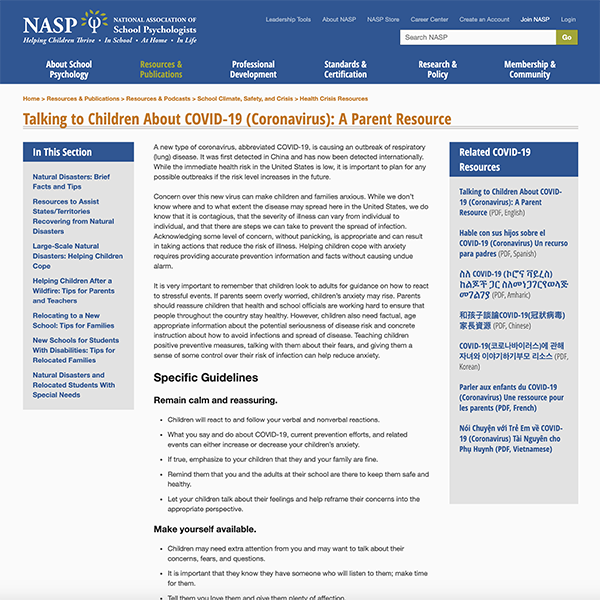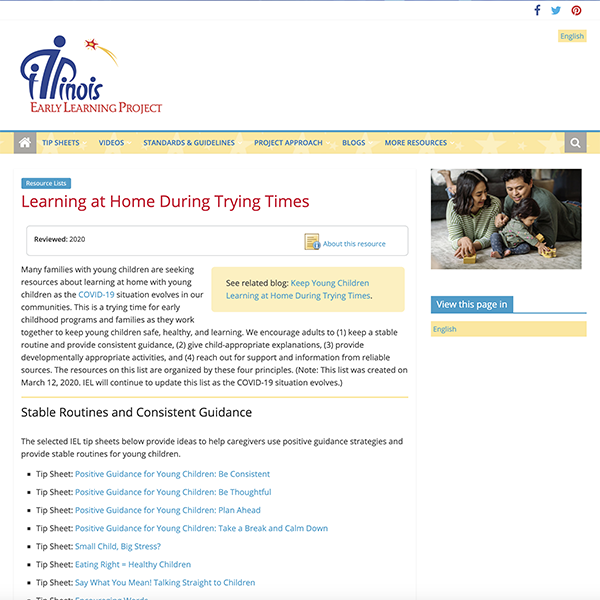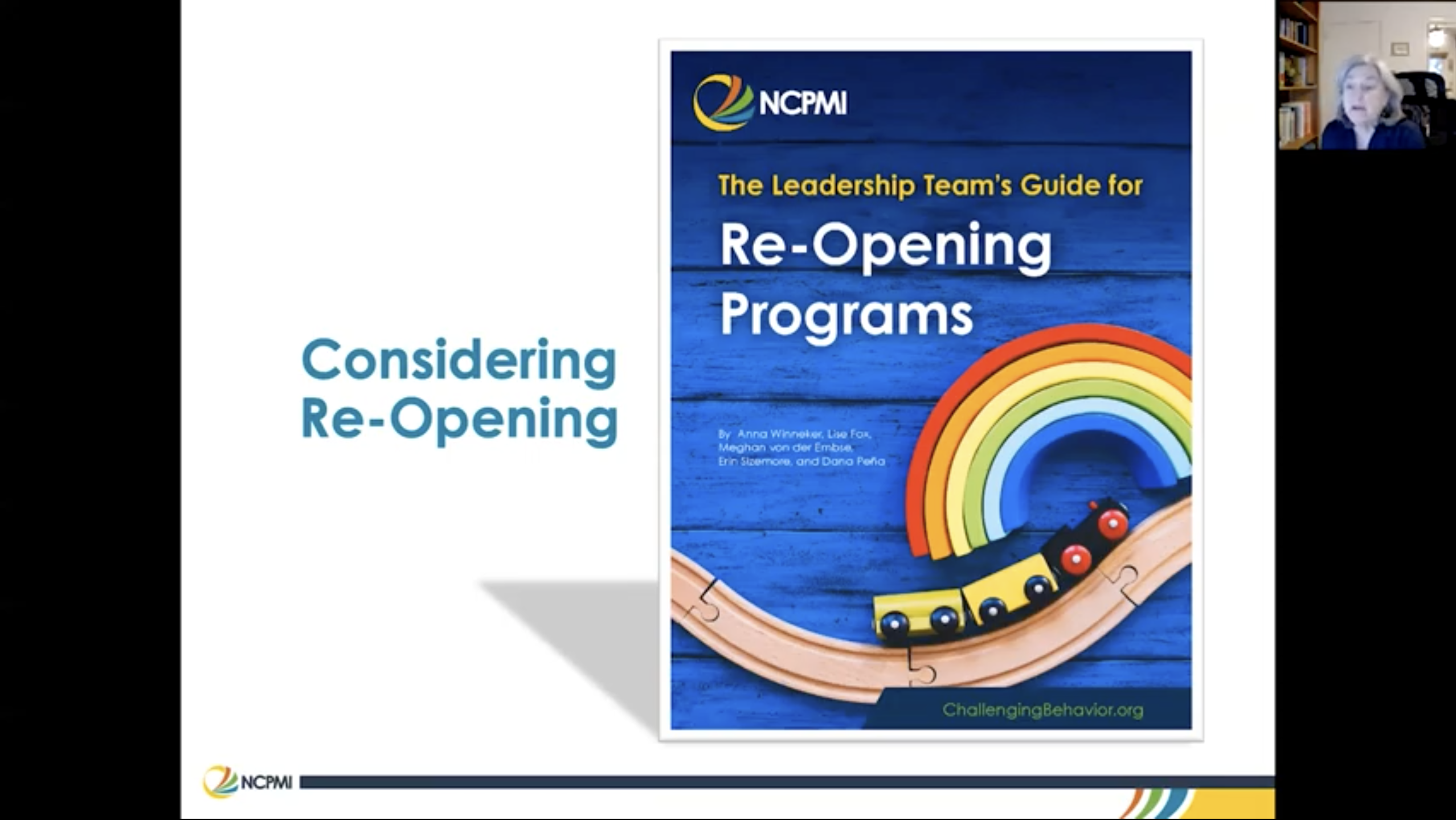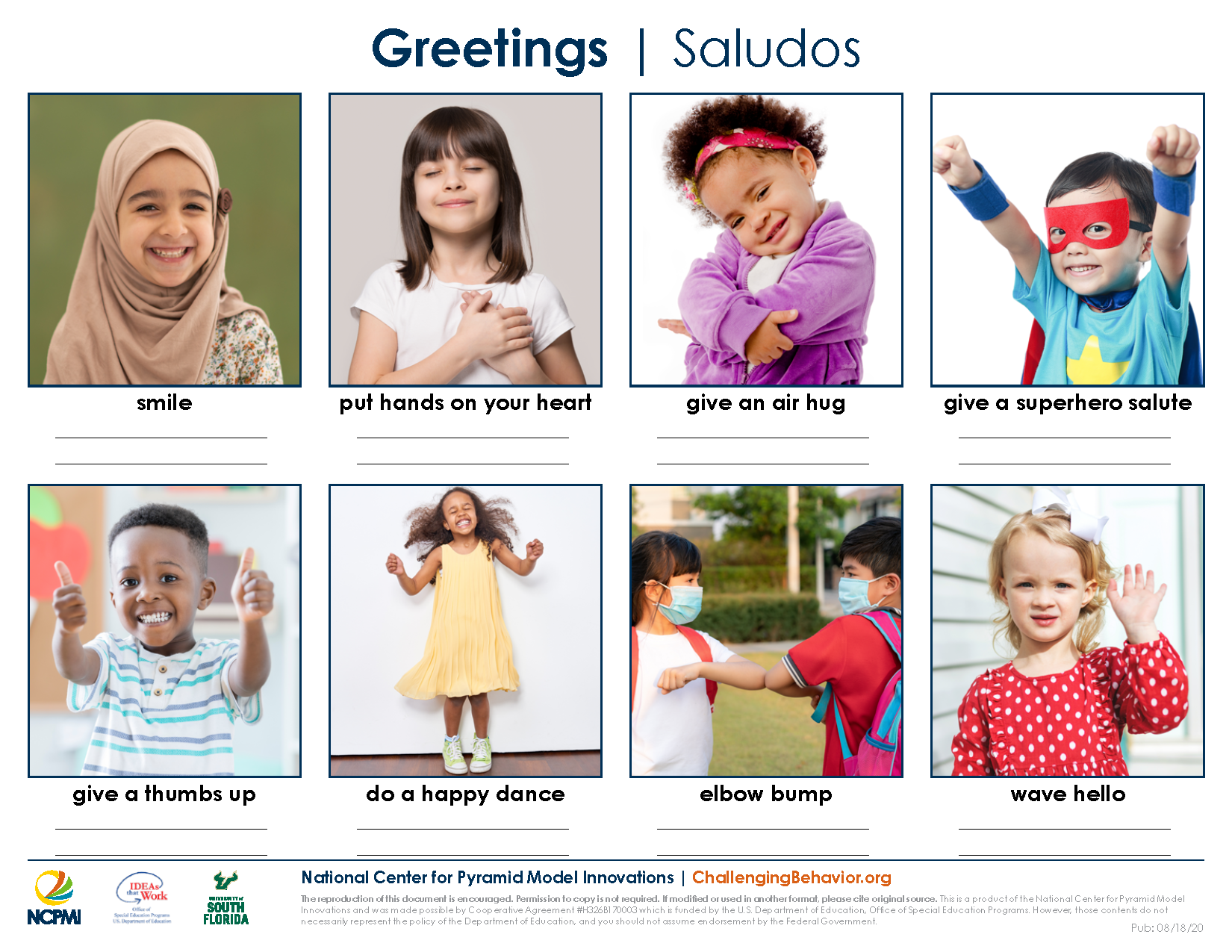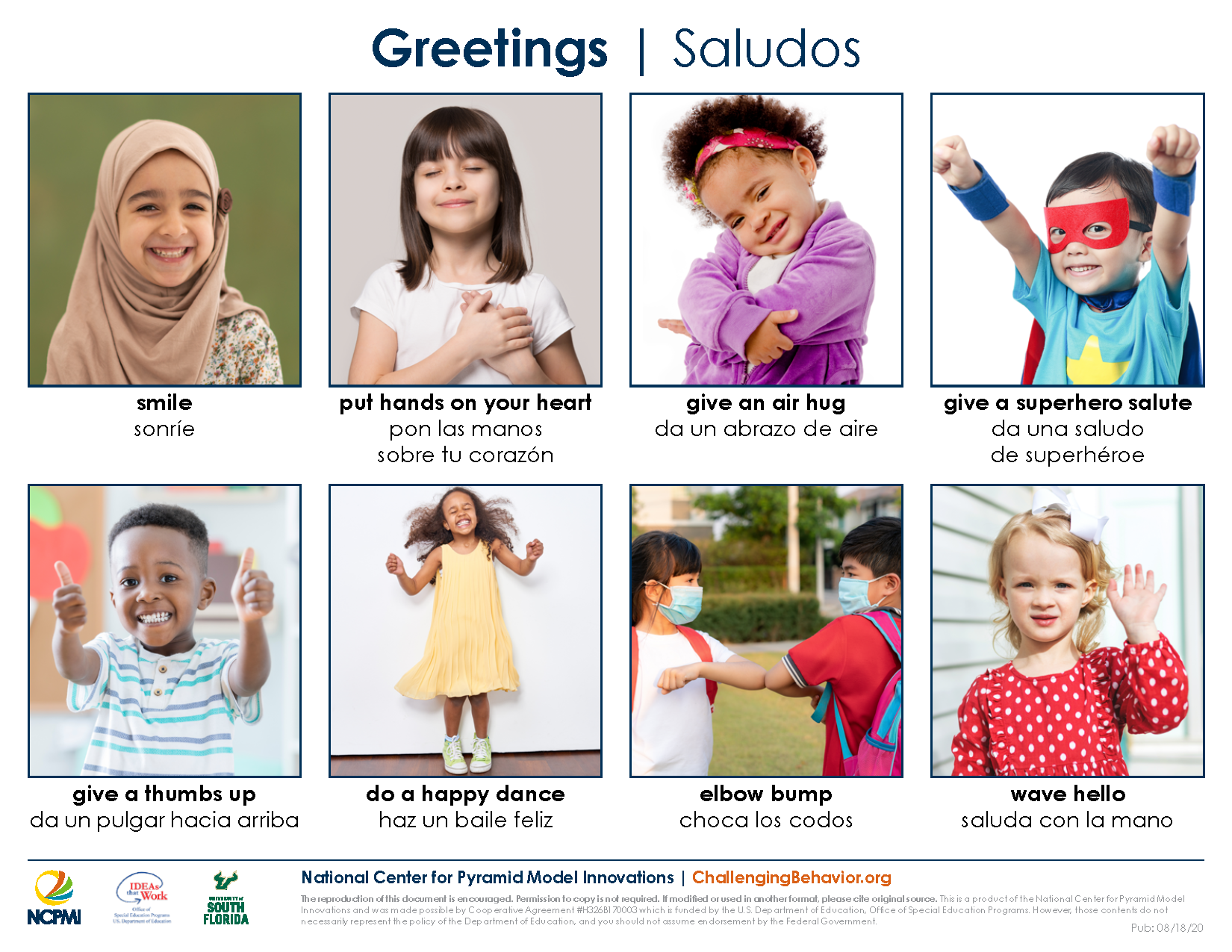The following are resources to support families in helping young children cope with the challenges that might occur during stressful emergency or disaster situations. This website will be updated as we obtain more resources.
Let’s work as a community to support our little ones! Do you have a COVID 19/emergency-related Pyramid Model or early childhood resource you want to share with families? Email it to sipayton@usf.edu.

Helping your child during the pandemic provides families with a few strategies to help their child cope during the pandemic. Programs and professionals are encouraged to post this resource on their web sites or share through social media.

Helping your child during the pandemic provides families with a few strategies to help their child cope during the pandemic. Programs and professionals are encouraged to post this resource on their web sites or share through social media.
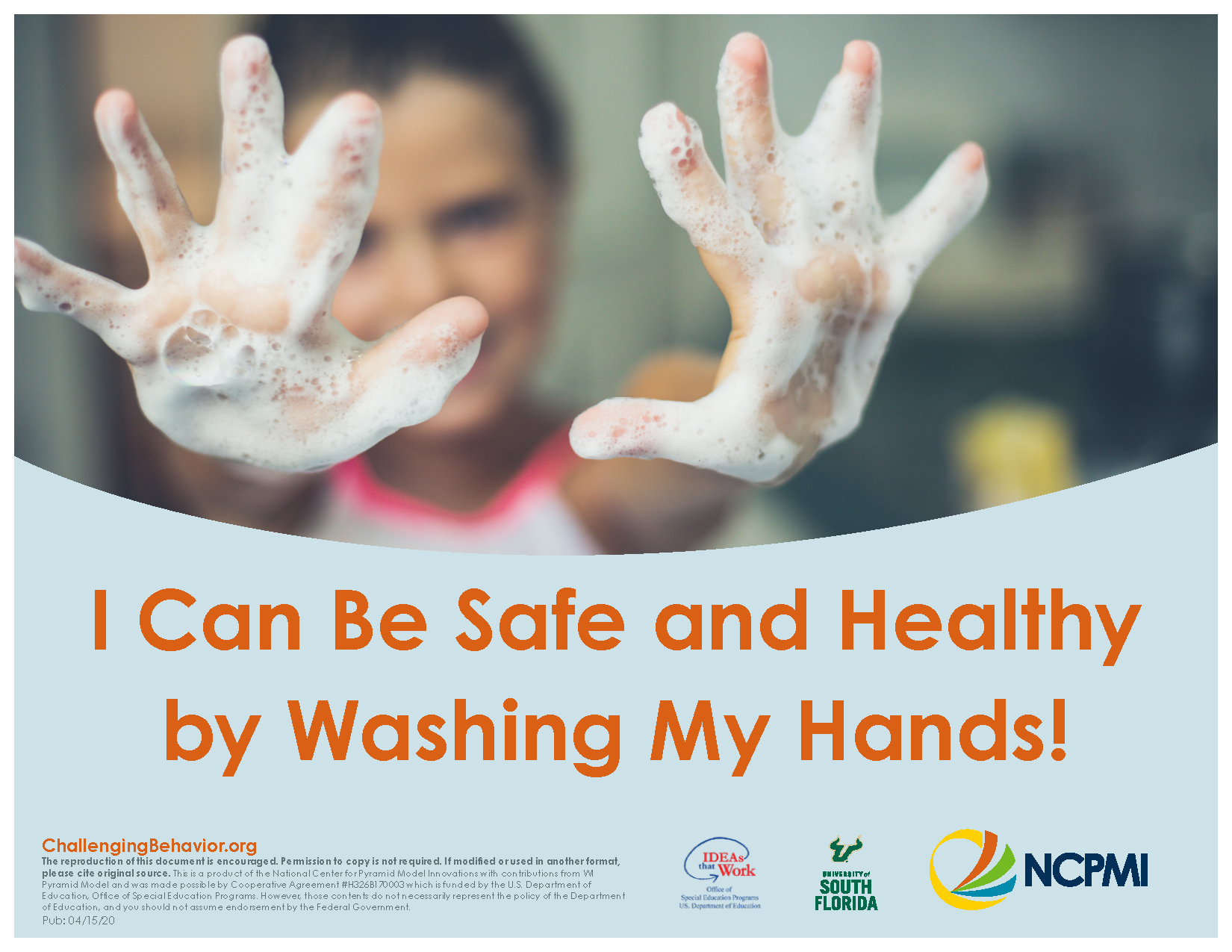
Use this scripted story to teach a child about the why and how to wash hands.

Use this scripted story to teach a child about the why and how to wash hands.

This presentation will focus on specific steps that early care and education administrators and practitioners can and need to take right no to ensure a functional preschool setting during this pandemic. Specific examples from the Pyramid Model will be highlighted.
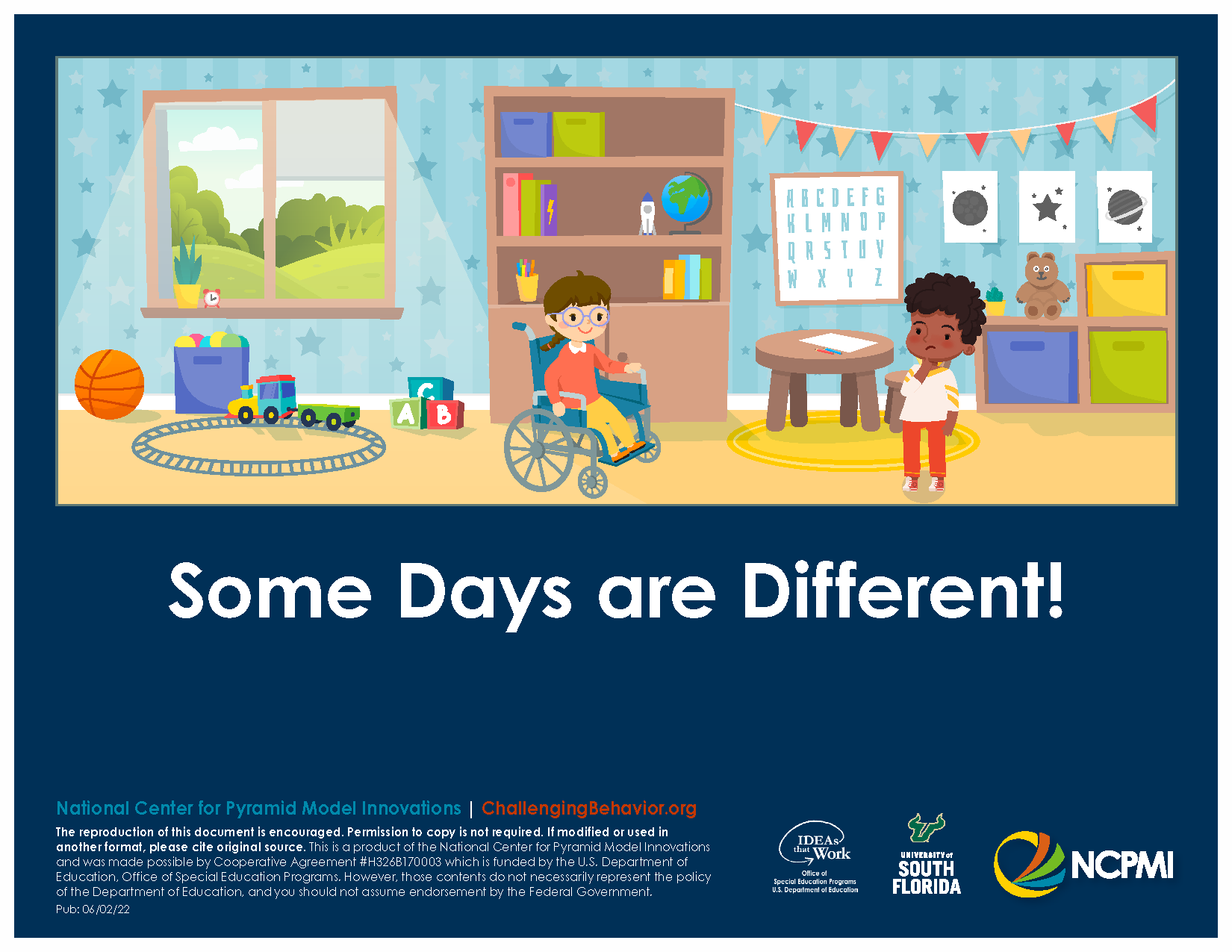
Use this sample scripted story to help support children when the day at school is different, specifically when children are temporarily in a different classroom with a new teacher.
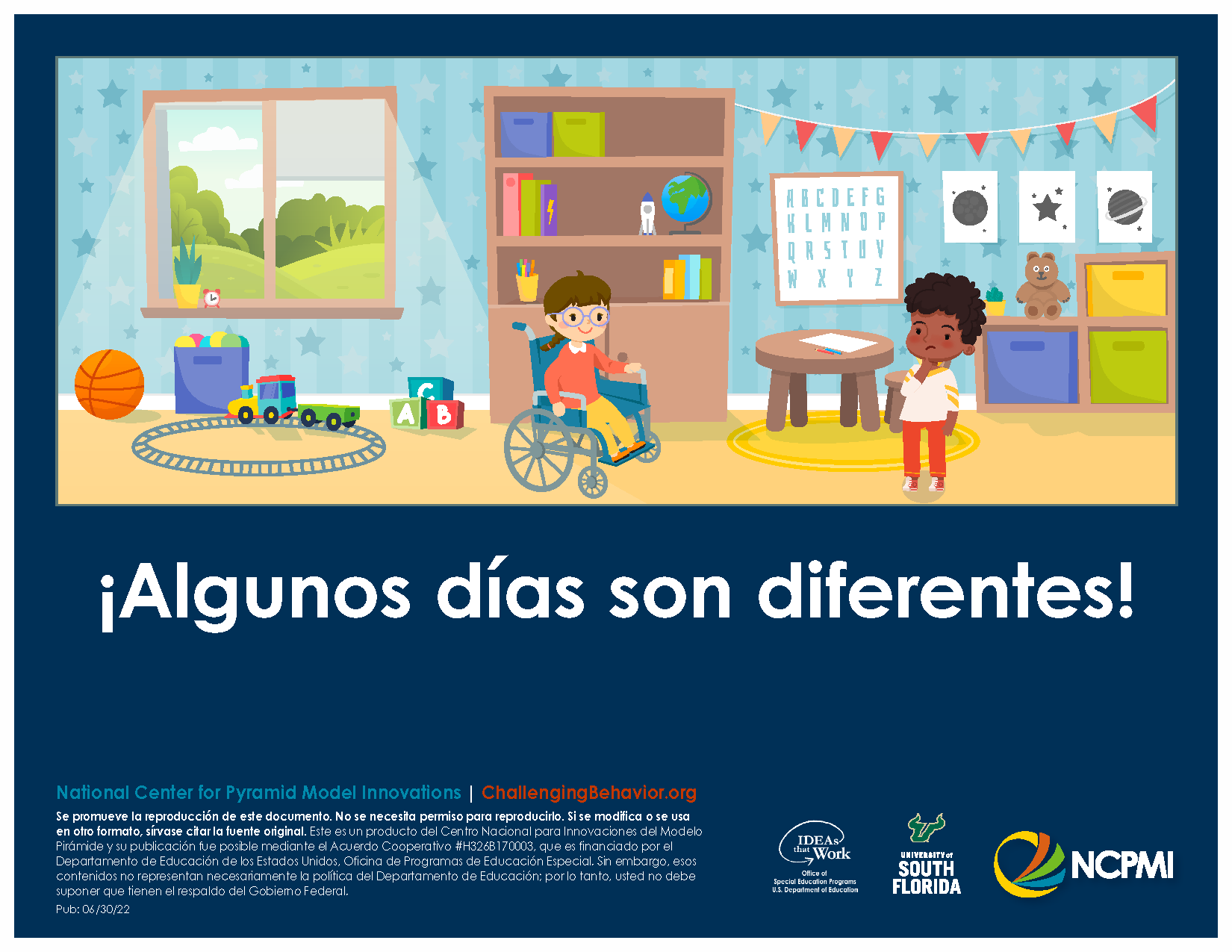
Use this sample scripted story to help support children when the day at school is different, specifically when children are temporarily in a different classroom with a new teacher.
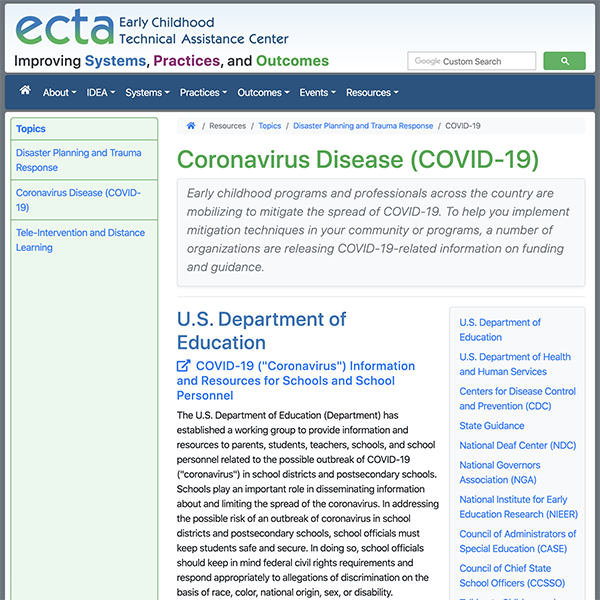

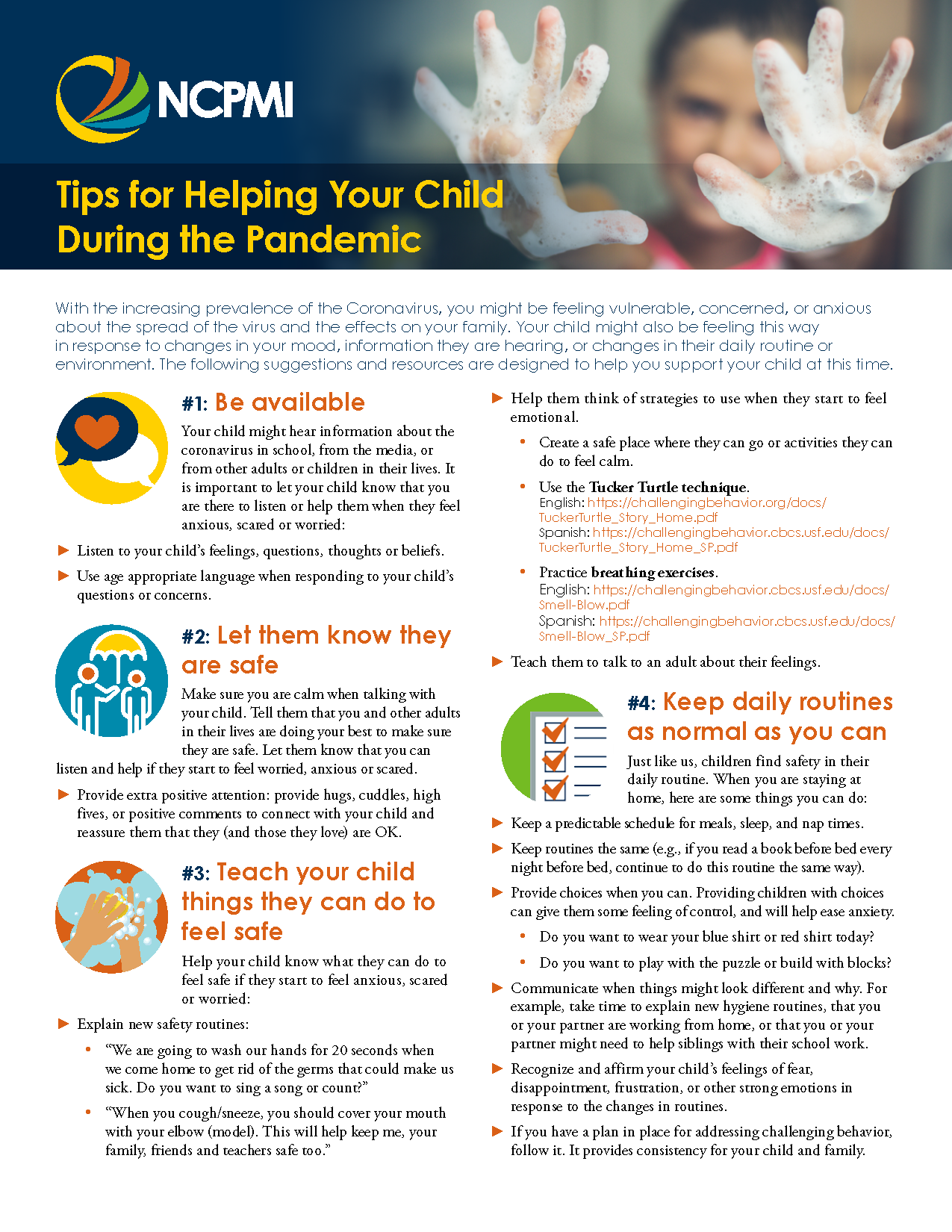
Tips for helping your child during the pandemic provides families with suggestions and resources for helping their child cope with stress, changes, and staying at home.

Tips for helping your child during the pandemic provides families with suggestions and resources for helping their child cope with stress, changes, and staying at home.

This scripted story helps to explain to children the how, why, and when of wearing face masks.

This scripted story helps to explain to children the how, why, and when of wearing face masks.
Community Partner Resources


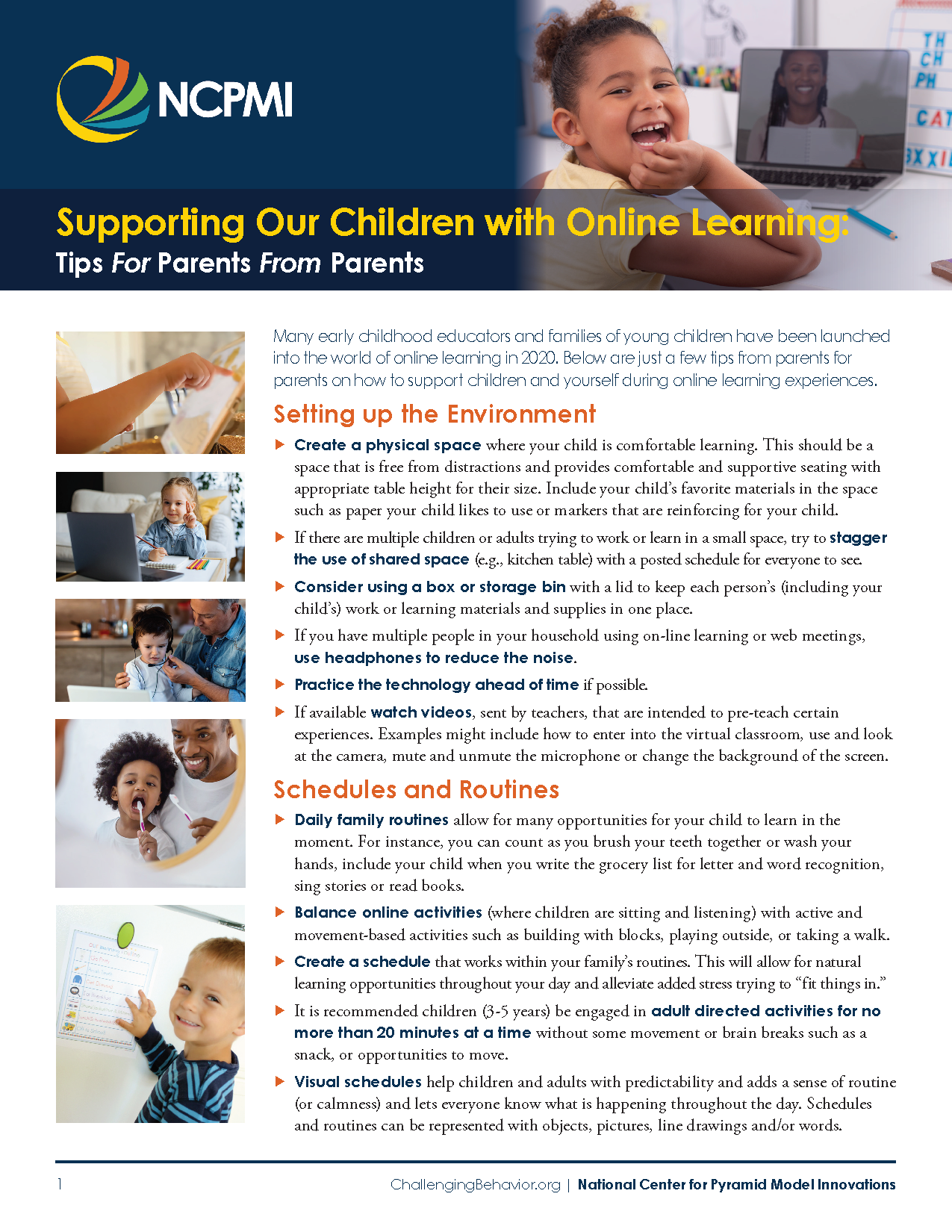
Many early childhood educators and families of young children have been launched into the world of online learning in 2020. This resource provides a few tips from parents for parents on how to support children and yourself during online learning experiences.
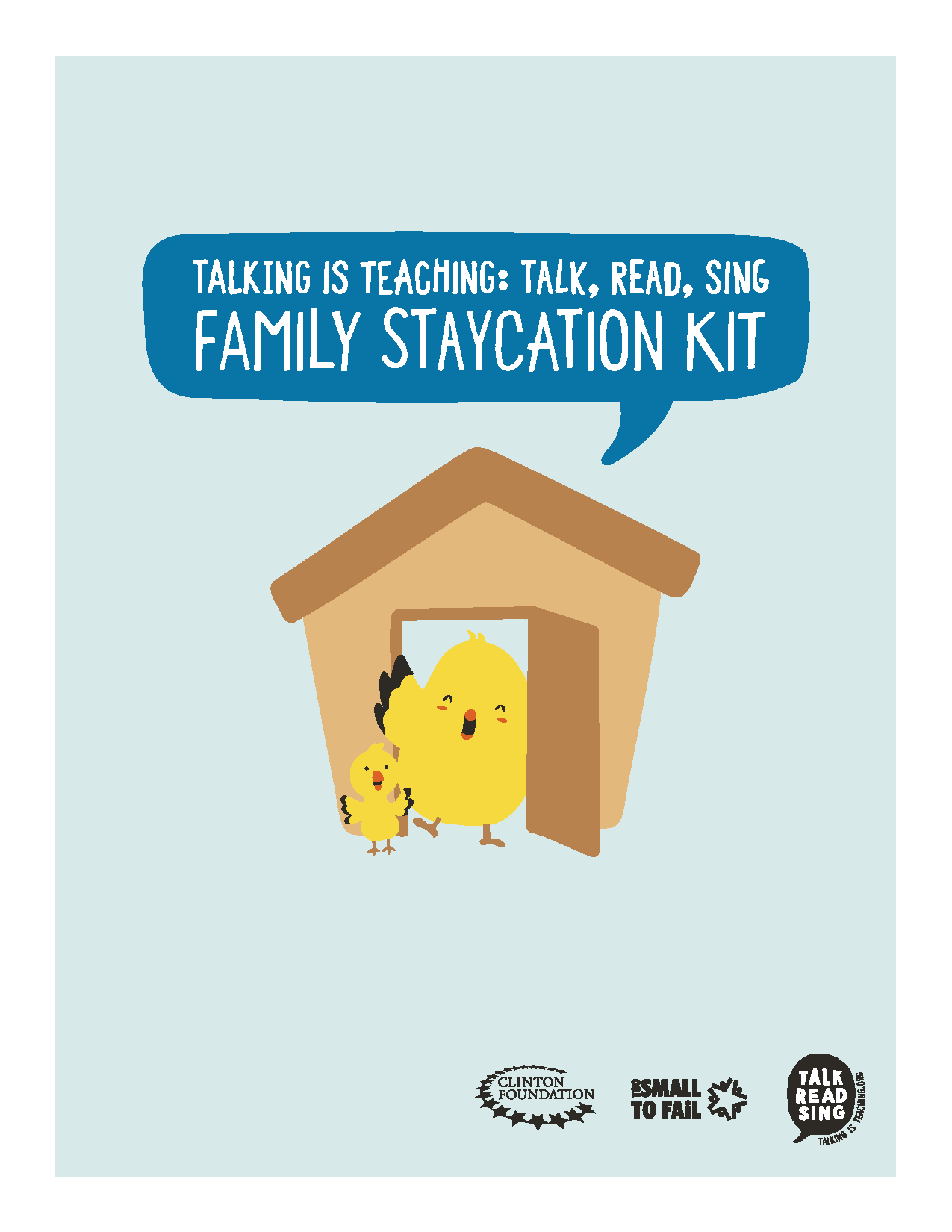
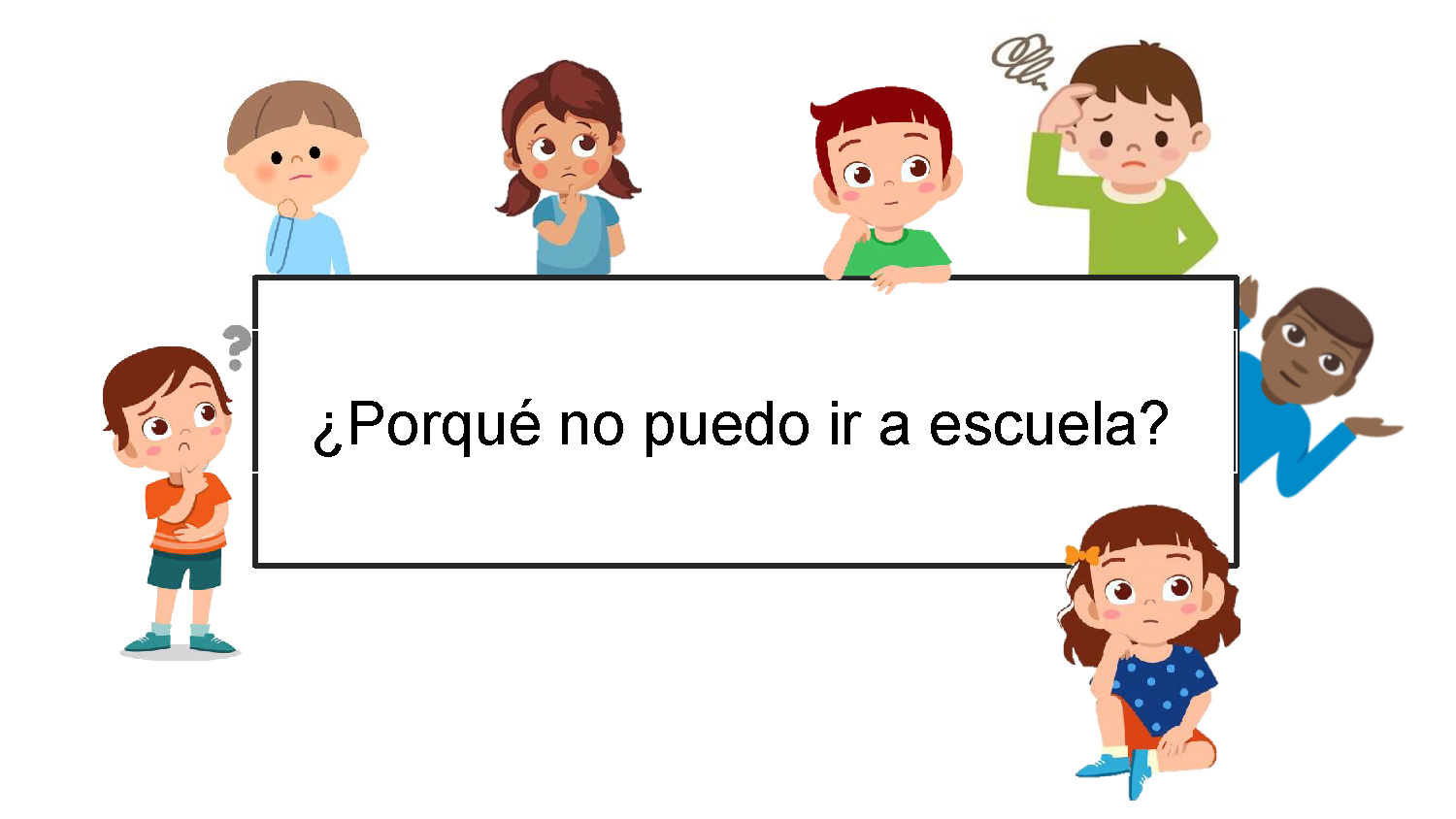

Scripted story to help families explain to children why they have to stay home during emergency or disaster situations.

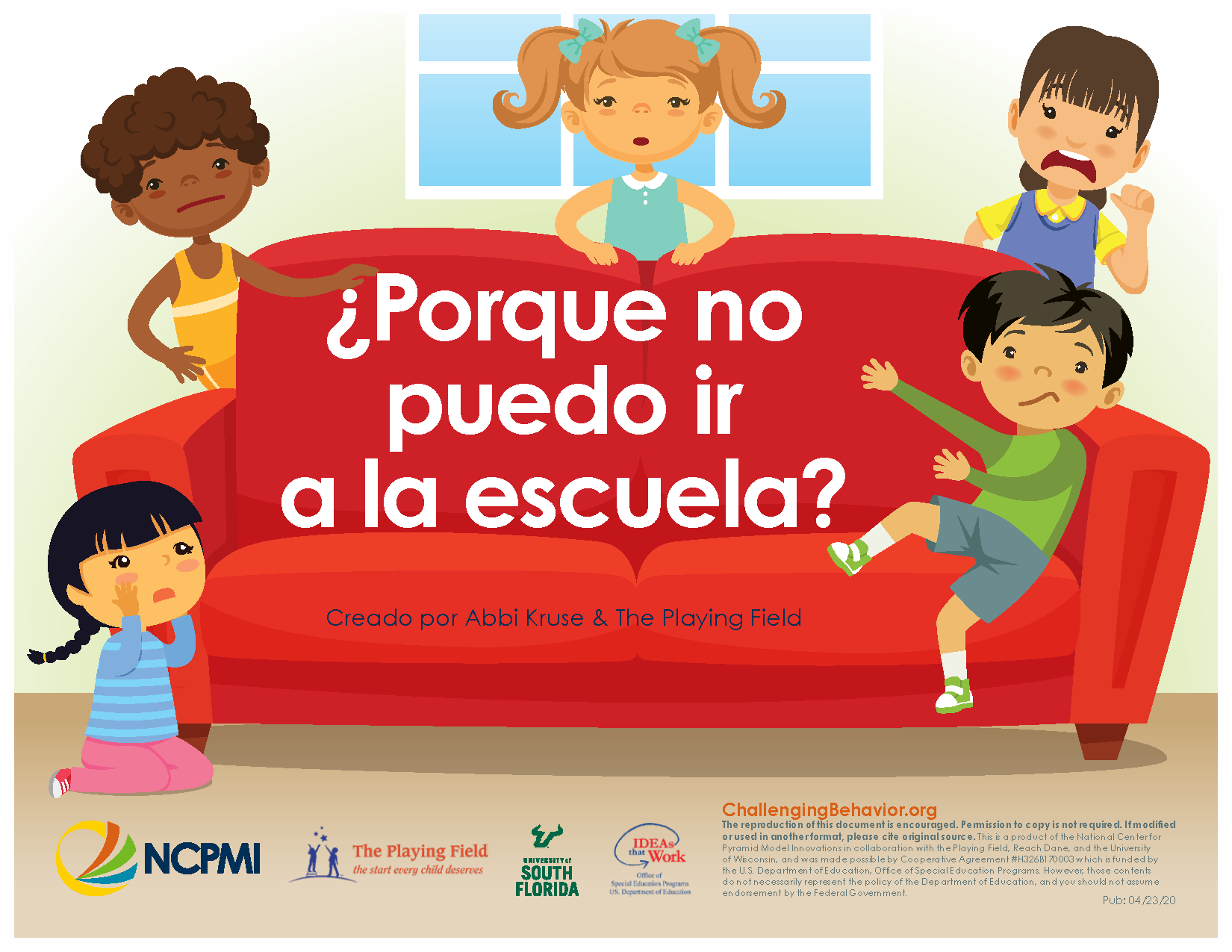
Scripted story to help families explain to children why they have to stay home during emergency or disaster situations.

Community Partner Resources




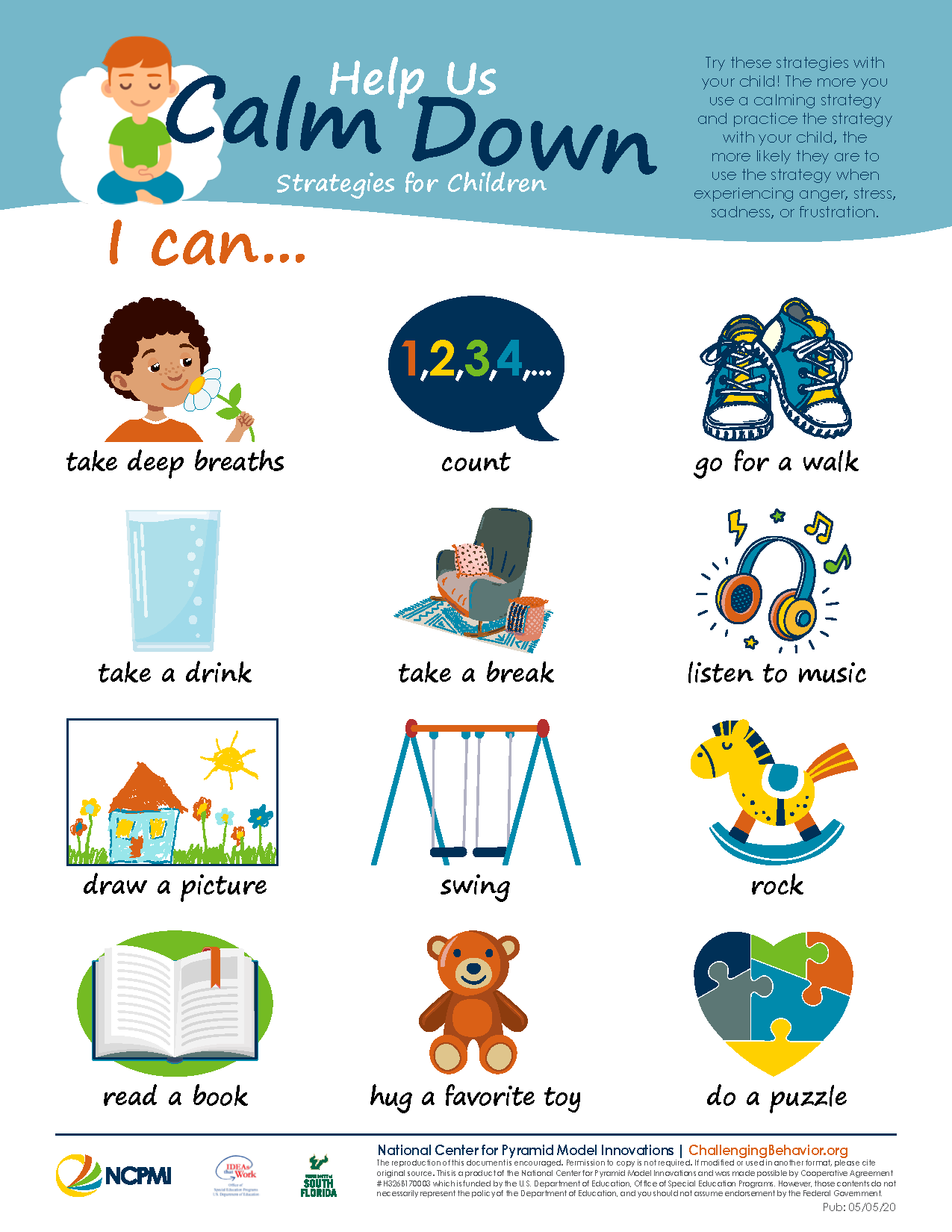
Try these strategies with your child! The more you use a calming strategy and practice the strategy with your child, the more likely they are to use the strategy when experiencing anger, stress, sadness, or frustration.
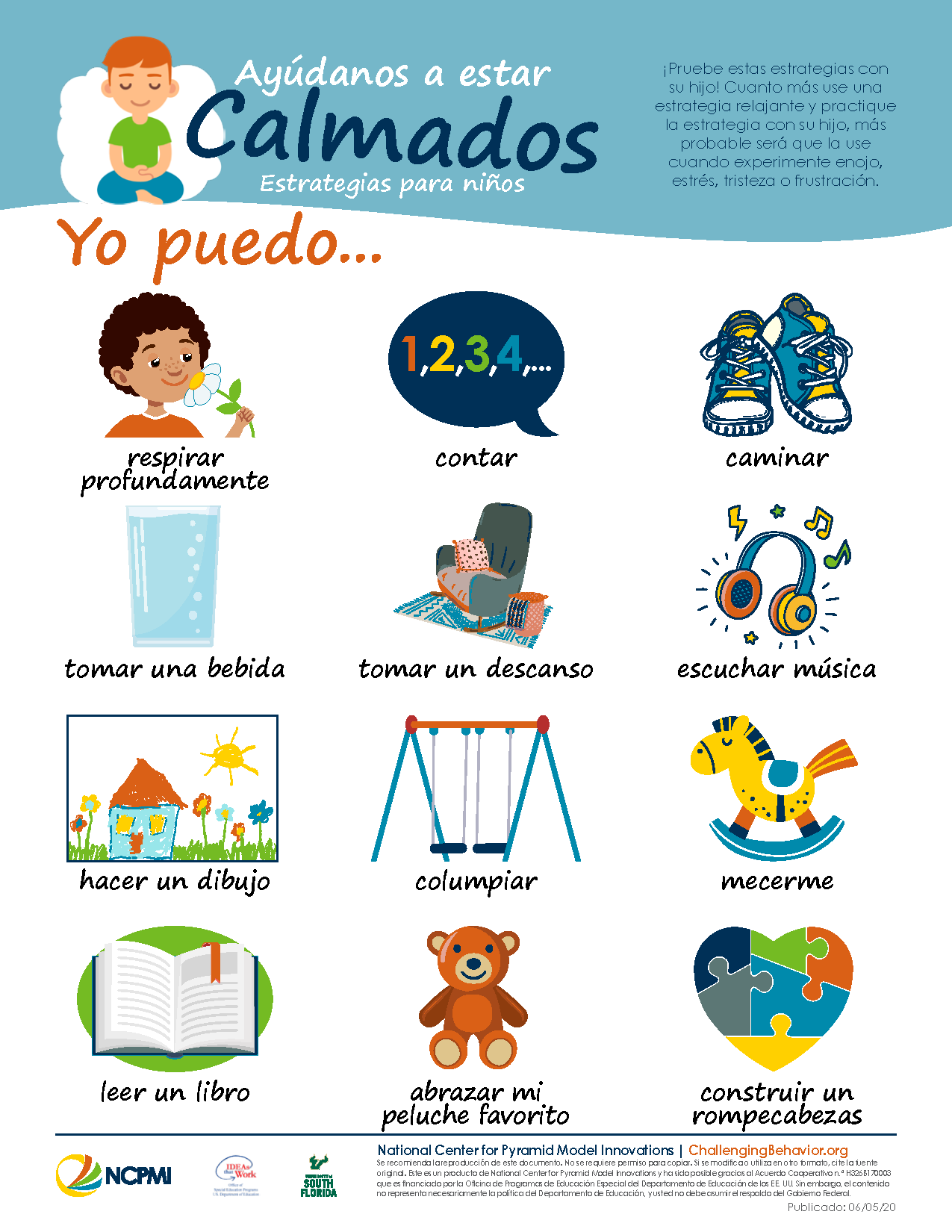
Try these strategies with your child! The more you use a calming strategy and practice the strategy with your child, the more likely they are to use the strategy when experiencing anger, stress, sadness, or frustration.
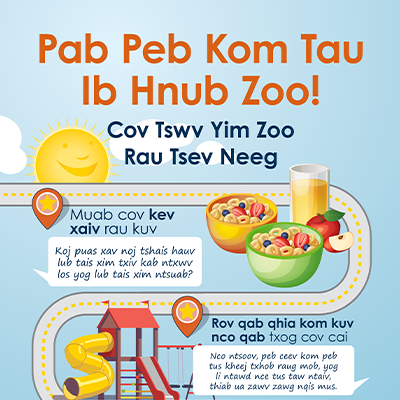
This infographic is the first in a series of tips for families. Early care and education and family support programs are encouraged to download the infographic to use in their social media to families or repost on their web site.
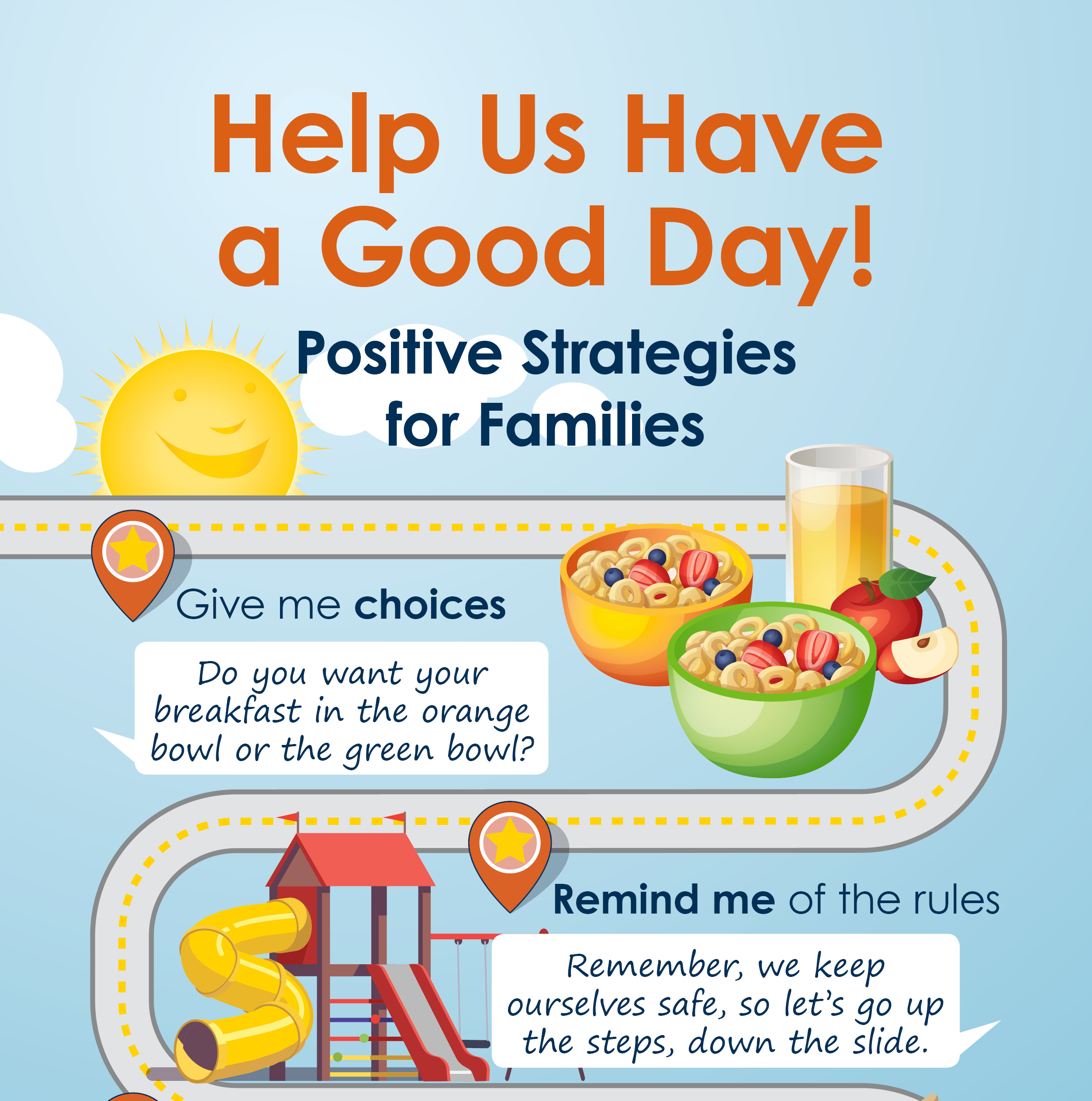
This infographic is the first in a series of tips for families. Early care and education and family support programs are encouraged to download the infographic to use in their social media to families or repost on their web site.

This infographic is the first in a series of tips for families. Early care and education and family support programs are encouraged to download the infographic to use in their social media to families or repost on their web site.
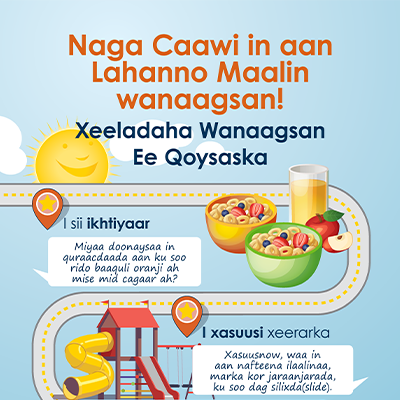
This infographic is the first in a series of tips for families. Early care and education and family support programs are encouraged to download the infographic to use in their social media to families or repost on their web site.

This infographic is the first in a series of tips for families. Early care and education and family support programs are encouraged to download the infographic to use in their social media to families or repost on their web site.

This infographic is the first in a series of tips for families. Early care and education and family support programs are encouraged to download the infographic to use in their social media to families or repost on their web site.

This infographic is the first in a series of tips for families. Early care and education and family support programs are encouraged to download the infographic to use in their social media to families or repost on their web site.
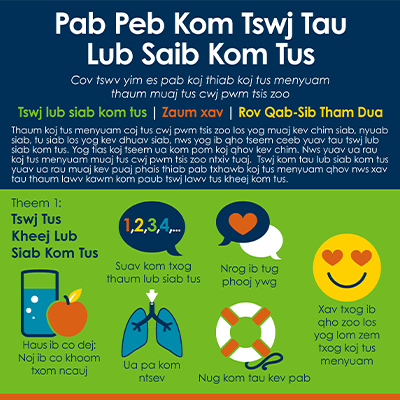
When a child is engaged in challenging behavior or experiencing anger, stress, sadness or frustration, it is important to stay calm. The strategies in this infographic help both caregiver and child stay calm during challenging behavior. Early care and education and family support programs are encouraged to download the infographic to use in their social media to families or repost on their web site.
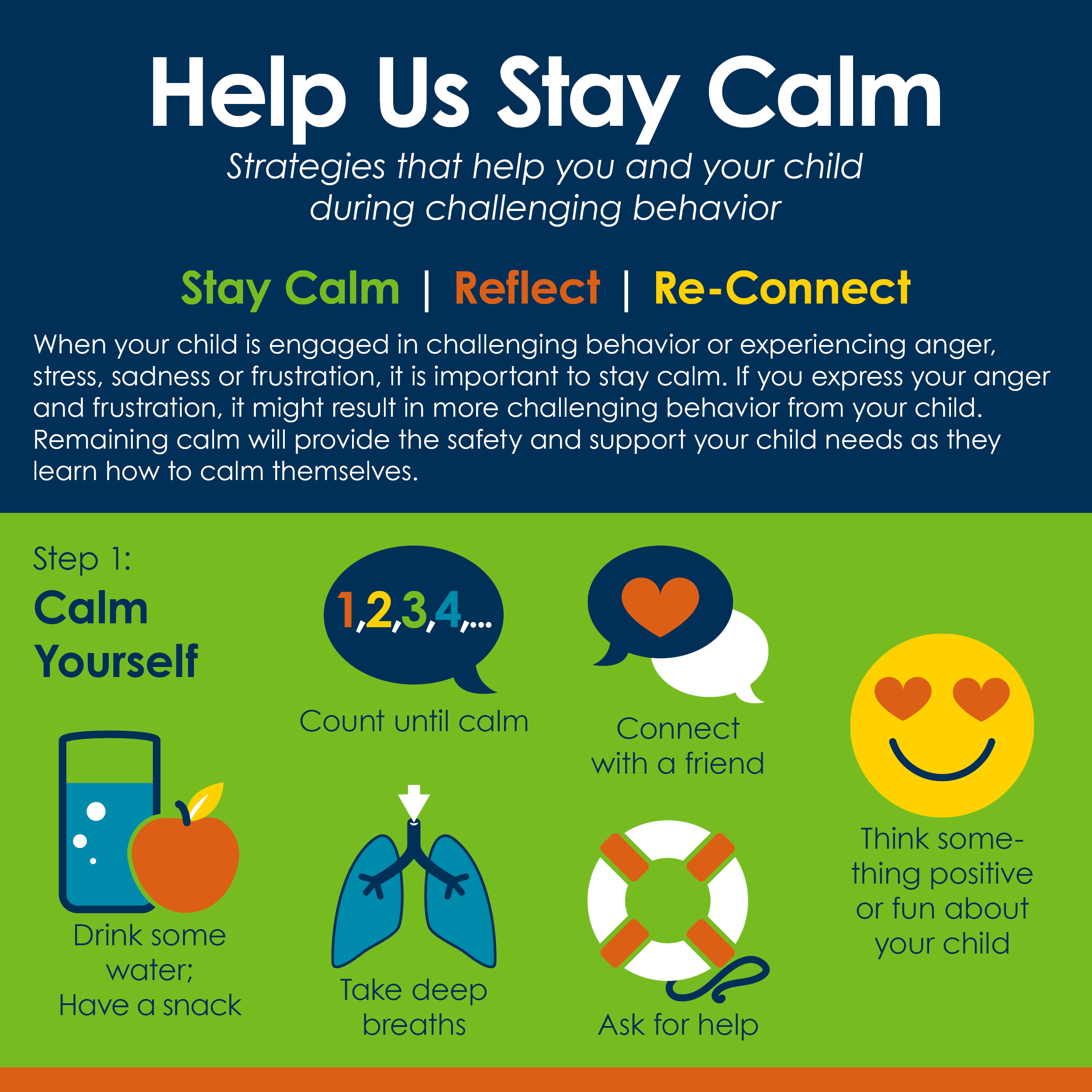
When a child is engaged in challenging behavior or experiencing anger, stress, sadness or frustration, it is important to stay calm. The strategies in this infographic help both caregiver and child stay calm during challenging behavior. Early care and education and family support programs are encouraged to download the infographic to use in their social media to families or repost on their web site.

When a child is engaged in challenging behavior or experiencing anger, stress, sadness or frustration, it is important to stay calm. The strategies in this infographic help both caregiver and child stay calm during challenging behavior. Early care and education and family support programs are encouraged to download the infographic to use in their social media to families or repost on their web site.
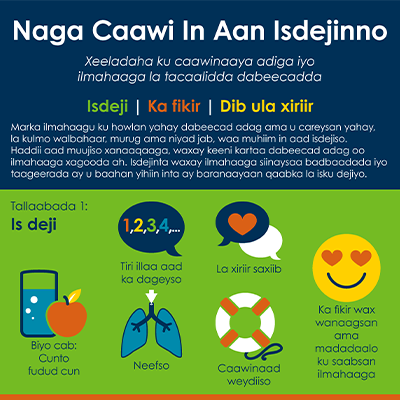
When a child is engaged in challenging behavior or experiencing anger, stress, sadness or frustration, it is important to stay calm. The strategies in this infographic help both caregiver and child stay calm during challenging behavior. Early care and education and family support programs are encouraged to download the infographic to use in their social media to families or repost on their web site.

When a child is engaged in challenging behavior or experiencing anger, stress, sadness or frustration, it is important to stay calm. The strategies in this infographic help both caregiver and child stay calm during challenging behavior. Early care and education and family support programs are encouraged to download the infographic to use in their social media to families or repost on their web site.
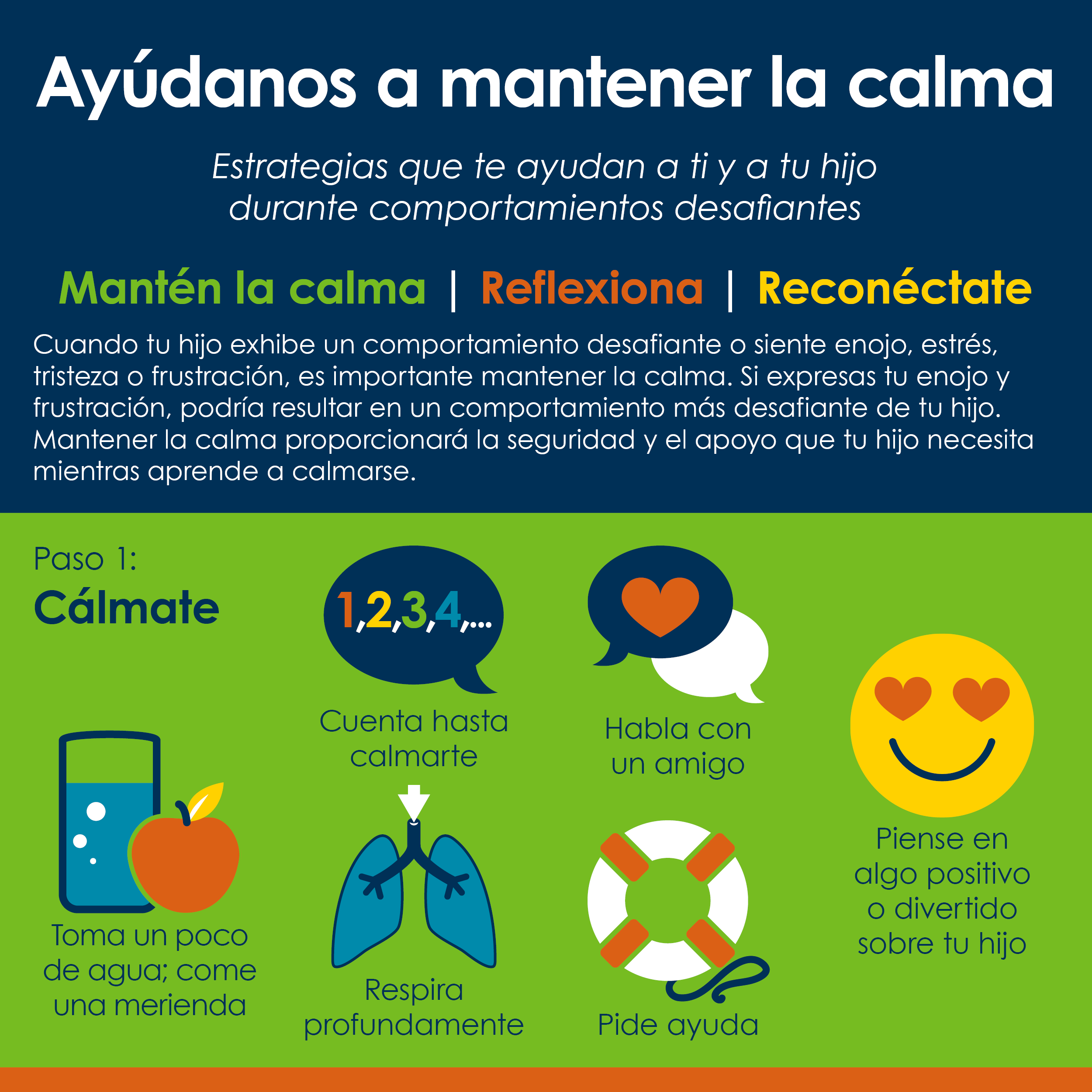
When a child is engaged in challenging behavior or experiencing anger, stress, sadness or frustration, it is important to stay calm. The strategies in this infographic help both caregiver and child stay calm during challenging behavior. Early care and education and family support programs are encouraged to download the infographic to use in their social media to families or repost on their web site.

When a child is engaged in challenging behavior or experiencing anger, stress, sadness or frustration, it is important to stay calm. The strategies in this infographic help both caregiver and child stay calm during challenging behavior. Early care and education and family support programs are encouraged to download the infographic to use in their social media to families or repost on their web site.

Many early childhood educators and families of young children have been launched into the world of online learning in 2020. This resource provides a few tips from parents for parents on how to support children and yourself during online learning experiences.
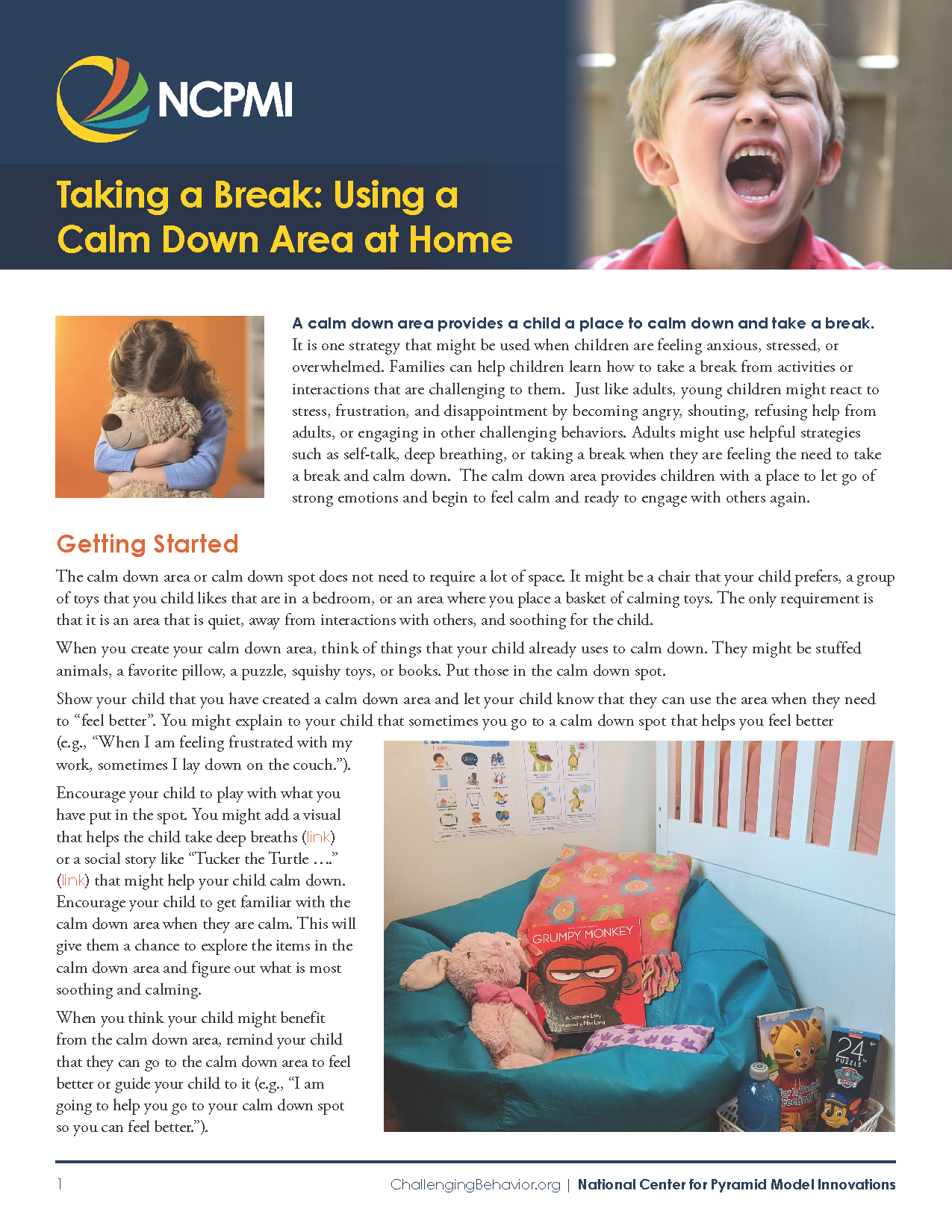
This resource includes instructions and tips for families on how to create a calm down area at home.
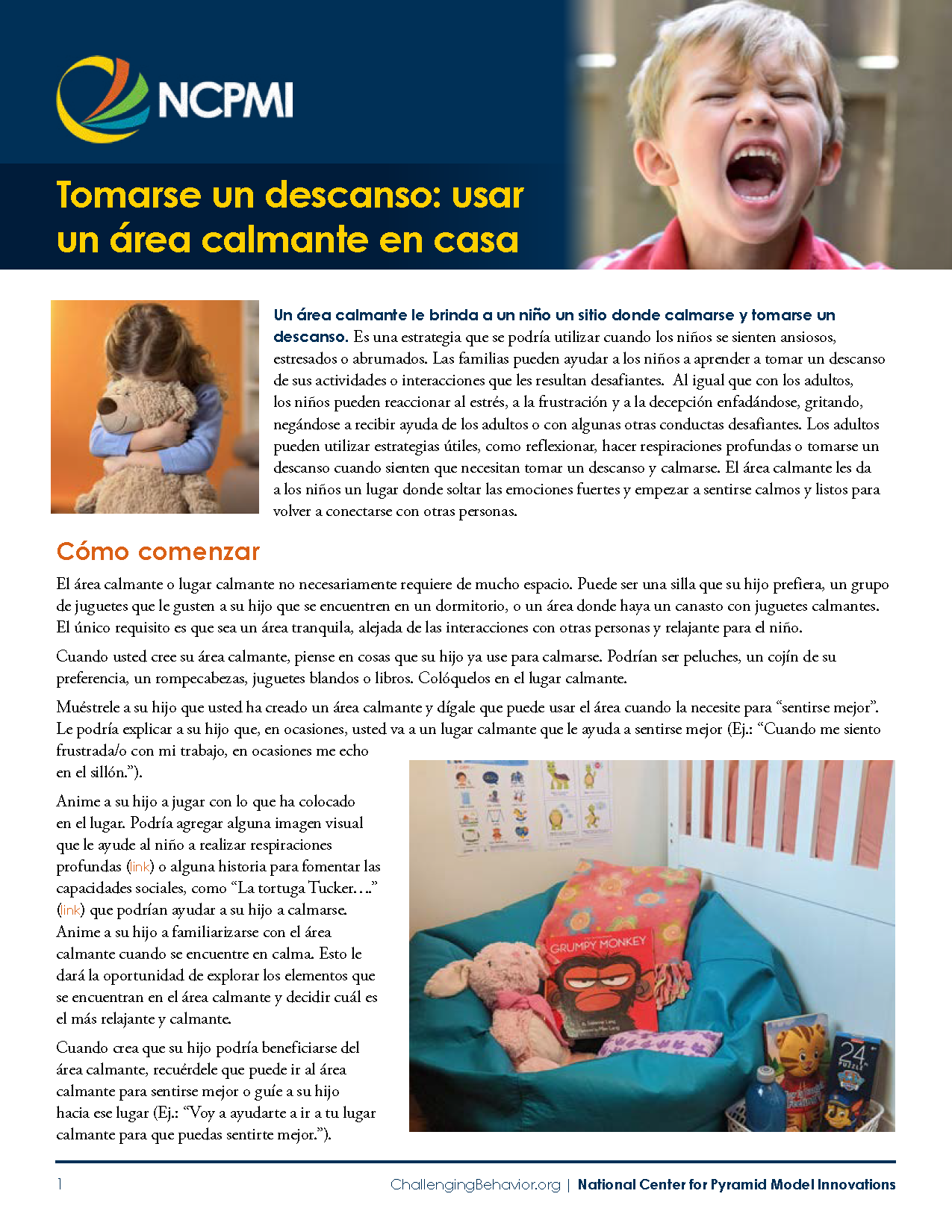
This resource includes instructions and tips for families on how to create a calm down area at home.
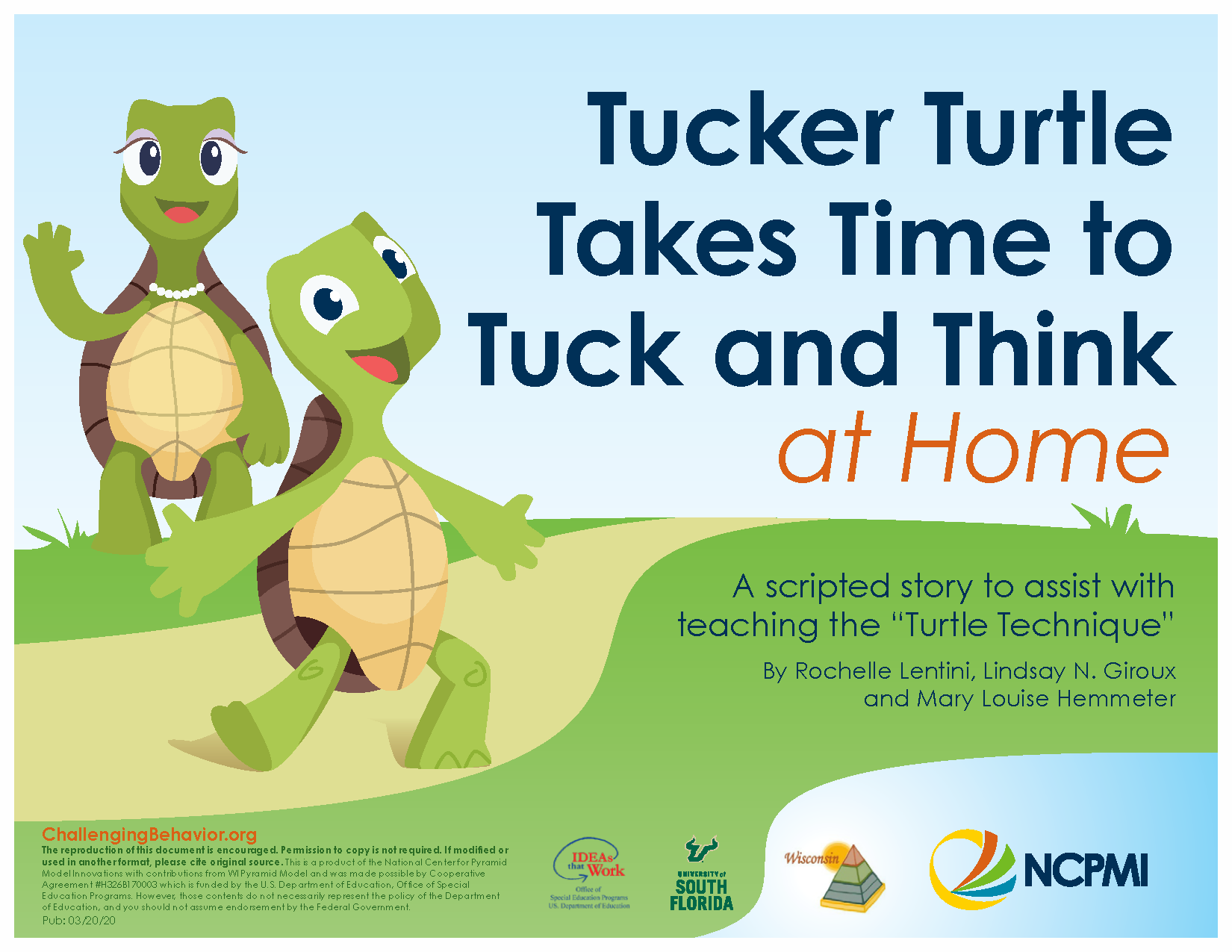
Tucker the Turtle provides a scripted story to teach young children how to calm down when they have strong feelings by tucking into their shell and taking deep breaths. The story also includes visuals to help children learn how to use the strategy.

Tucker the Turtle provides a scripted story to teach young children how to calm down when they have strong feelings by tucking into their shell and taking deep breaths. The story also includes visuals to help children learn how to use the strategy.
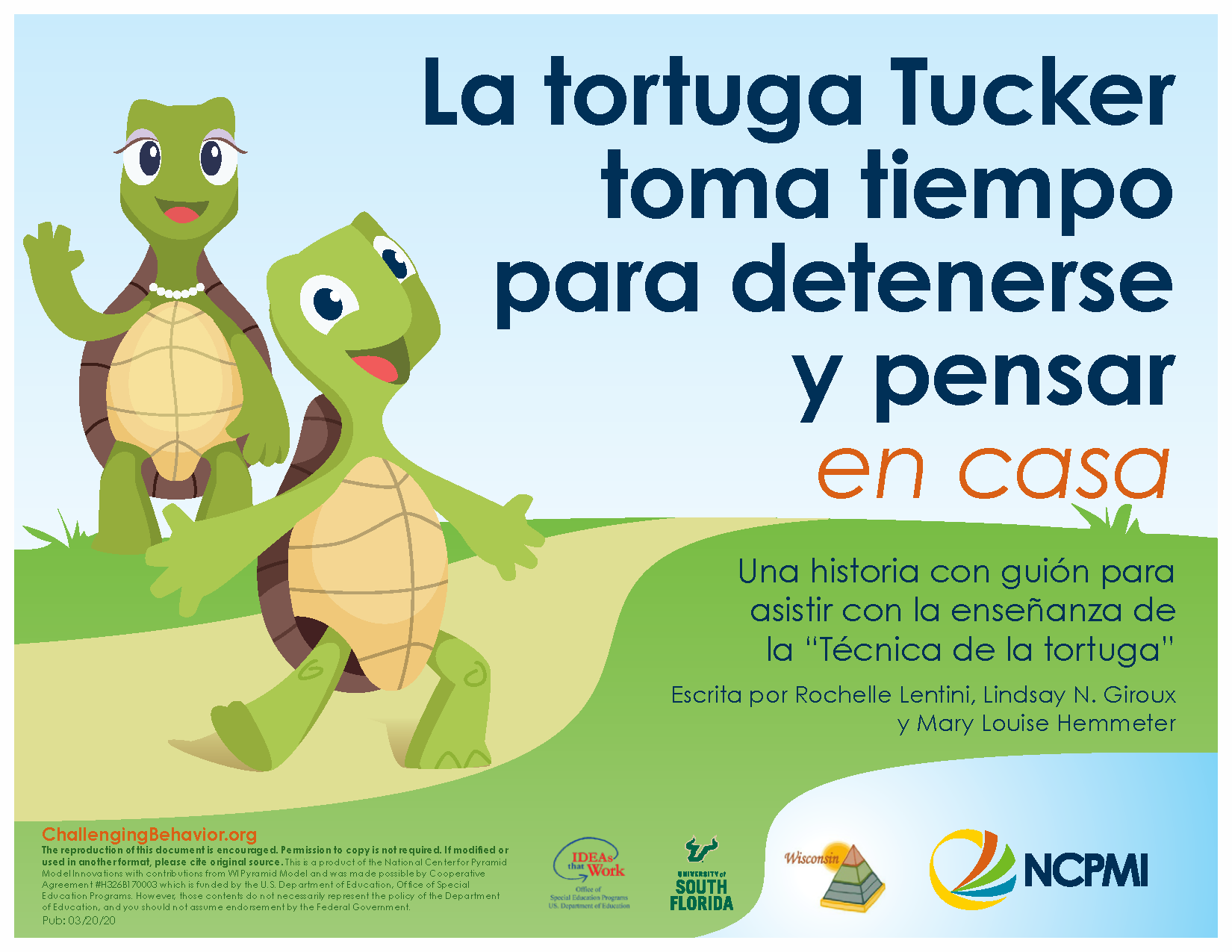
Tucker the Turtle provides a scripted story to teach young children how to calm down when they have strong feelings by tucking into their shell and taking deep breaths. The story also includes visuals to help children learn how to use the strategy.
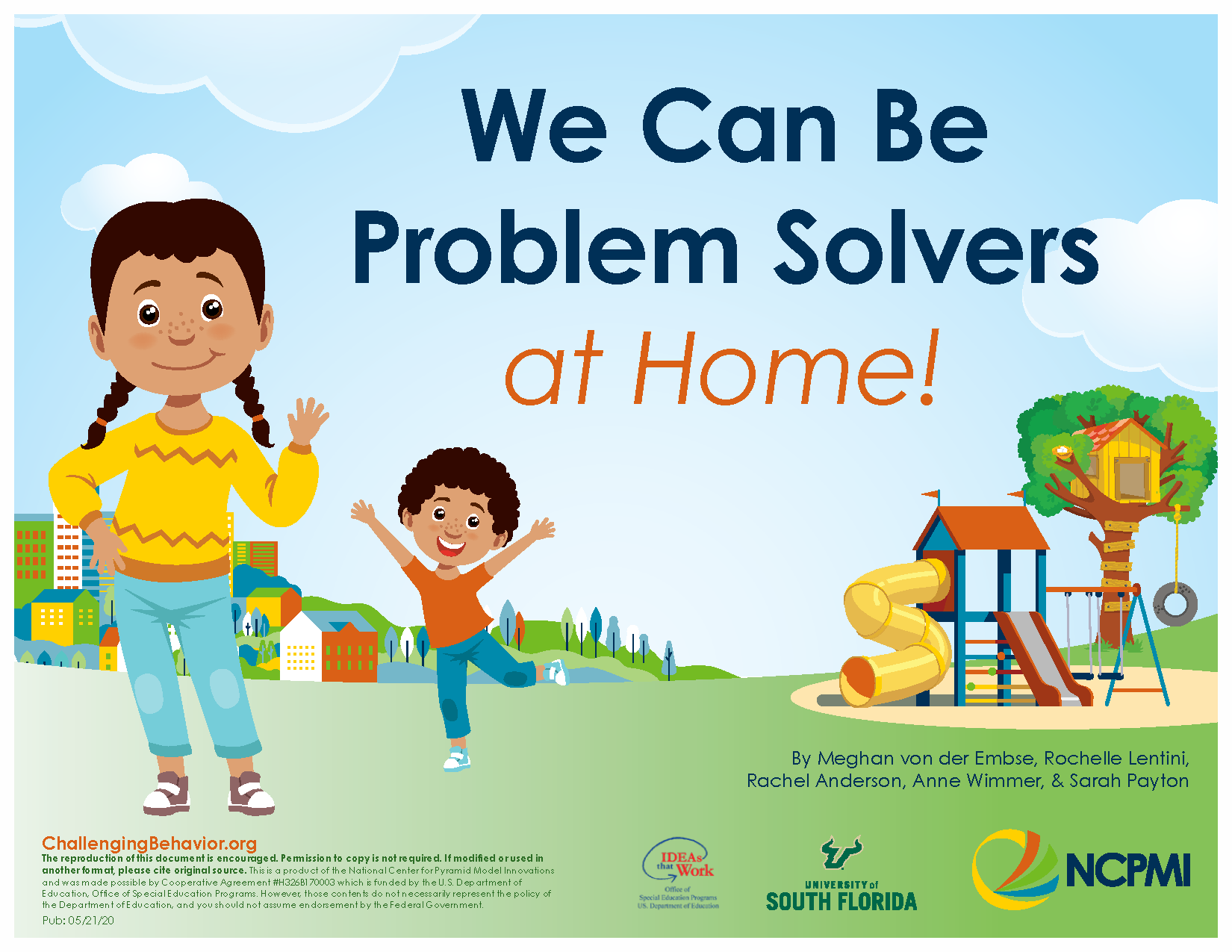
Scripted story to help children understand the steps to problem solving. Includes problem scenario cards to help children practice finding a solution to common social problems.

Scripted story to help children understand the steps to problem solving. Includes problem scenario cards to help children practice finding a solution to common social problems.

Scripted story to help children understand the steps to problem solving. Includes problem scenario cards to help children practice finding a solution to common social problems.
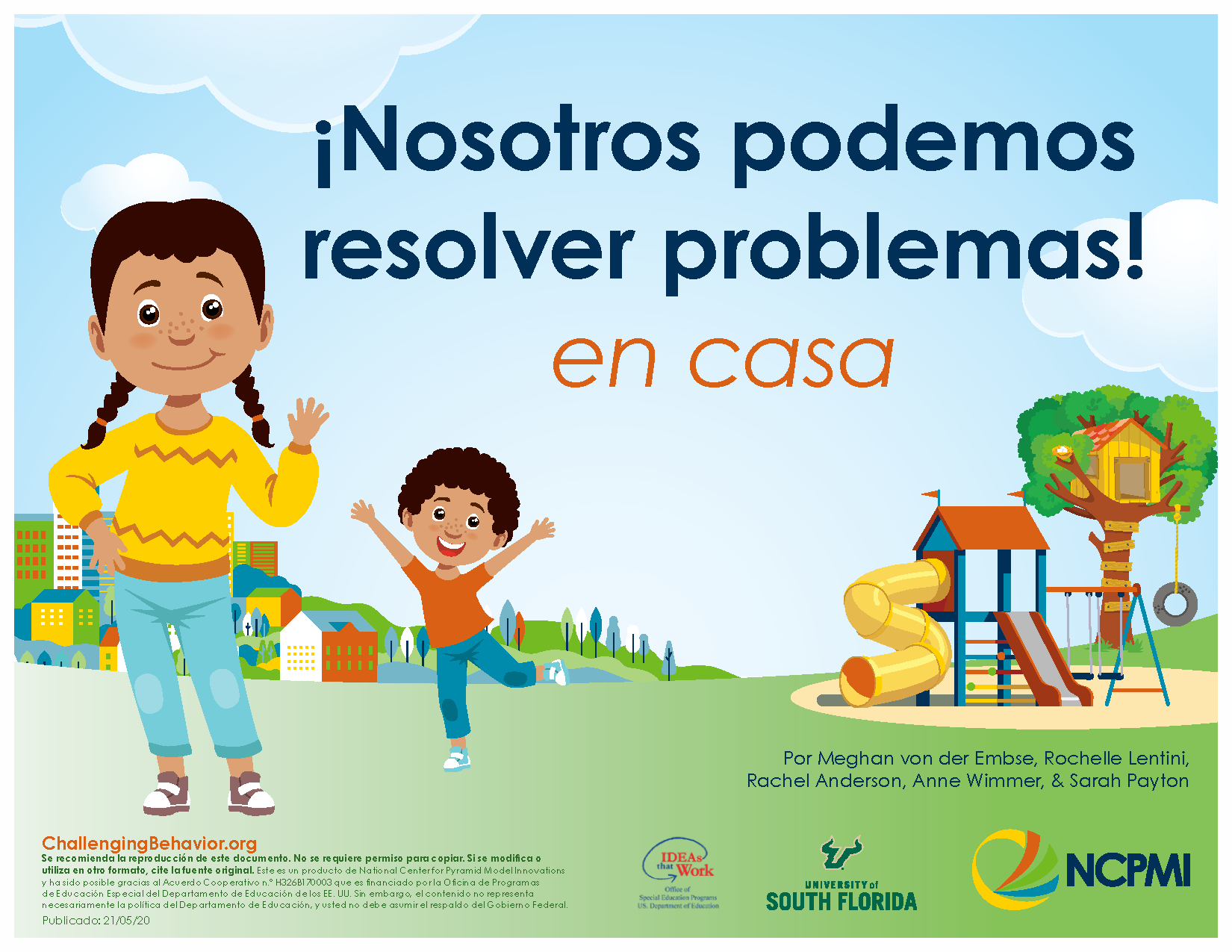
Scripted story to help children understand the steps to problem solving. Includes problem scenario cards to help children practice finding a solution to common social problems.

When a child is engaged in challenging behavior or experiencing anger, stress, sadness or frustration, it is important to stay calm. The strategies in this infographic help both caregiver and child stay calm during challenging behavior. Early care and education and family support programs are encouraged to download the infographic to use in their social media to families or repost on their web site.

When a child is engaged in challenging behavior or experiencing anger, stress, sadness or frustration, it is important to stay calm. The strategies in this infographic help both caregiver and child stay calm during challenging behavior. Early care and education and family support programs are encouraged to download the infographic to use in their social media to families or repost on their web site.

When a child is engaged in challenging behavior or experiencing anger, stress, sadness or frustration, it is important to stay calm. The strategies in this infographic help both caregiver and child stay calm during challenging behavior. Early care and education and family support programs are encouraged to download the infographic to use in their social media to families or repost on their web site.

When a child is engaged in challenging behavior or experiencing anger, stress, sadness or frustration, it is important to stay calm. The strategies in this infographic help both caregiver and child stay calm during challenging behavior. Early care and education and family support programs are encouraged to download the infographic to use in their social media to families or repost on their web site.

When a child is engaged in challenging behavior or experiencing anger, stress, sadness or frustration, it is important to stay calm. The strategies in this infographic help both caregiver and child stay calm during challenging behavior. Early care and education and family support programs are encouraged to download the infographic to use in their social media to families or repost on their web site.

When a child is engaged in challenging behavior or experiencing anger, stress, sadness or frustration, it is important to stay calm. The strategies in this infographic help both caregiver and child stay calm during challenging behavior. Early care and education and family support programs are encouraged to download the infographic to use in their social media to families or repost on their web site.

When a child is engaged in challenging behavior or experiencing anger, stress, sadness or frustration, it is important to stay calm. The strategies in this infographic help both caregiver and child stay calm during challenging behavior. Early care and education and family support programs are encouraged to download the infographic to use in their social media to families or repost on their web site.
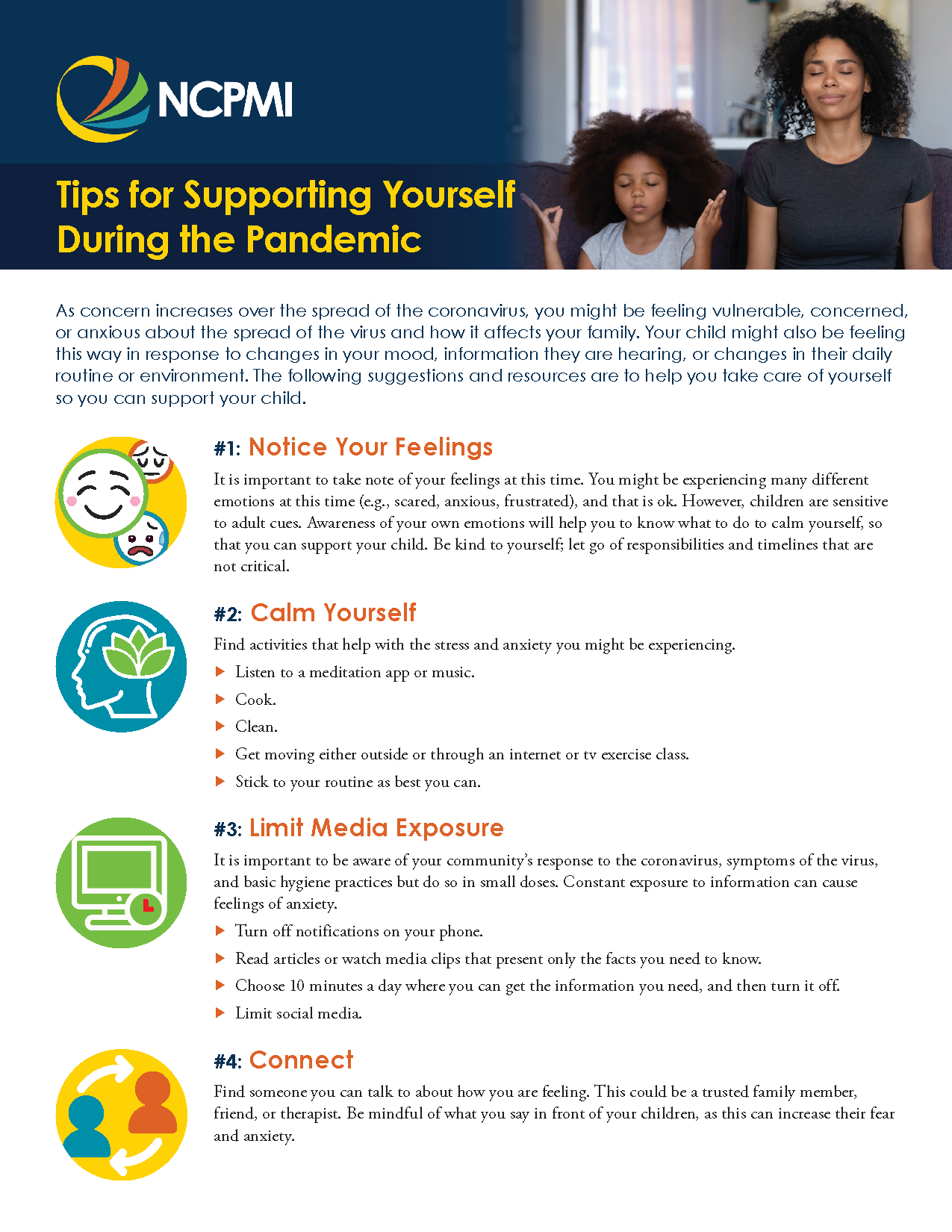
This tipsheet includes suggestions and resources to help you take care of yourself so you can support your child.

This tipsheet includes suggestions and resources to help you take care of yourself so you can support your child.

Due to the COVID pandemic, coaches and coachees have needed to adapt their coaching delivery and social-emotional teaching practices to a virtual format. Some of these practices are easier to adapt than others, leaving coaches and coachees wondering what to do. This webinar discusses how Pyramid Model practices can be used in virtual learning and strategies for implementing coaching of teachers virtually, including how to conduct observations and collect information on coachee practices.
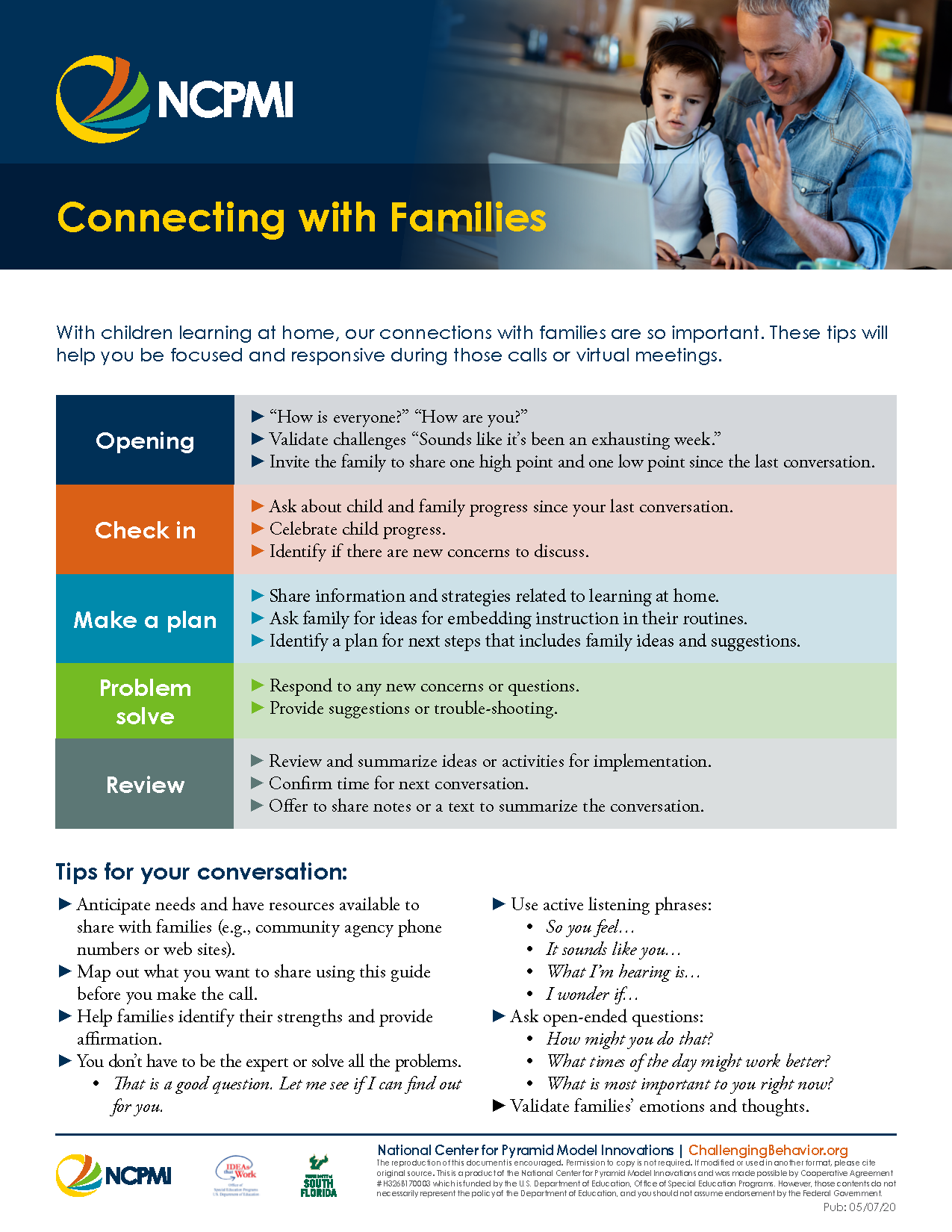
With children learning at home, our connections with families are so important. These tips will
help you be focused and responsive during those calls or virtual meetings.
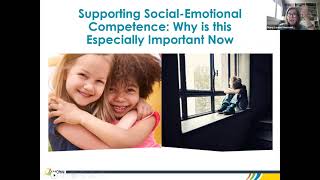
Join NCPMI leaders Lise Fox and Mary Louise Hemmeter for a discussion about what practices should be implemented to support children as they return to the classroom. The presenters will identify the priority social-emotional teaching practices for the preschool classroom, the use of Pyramid Model practices to support children entering kindergarten, and partnerships with families.
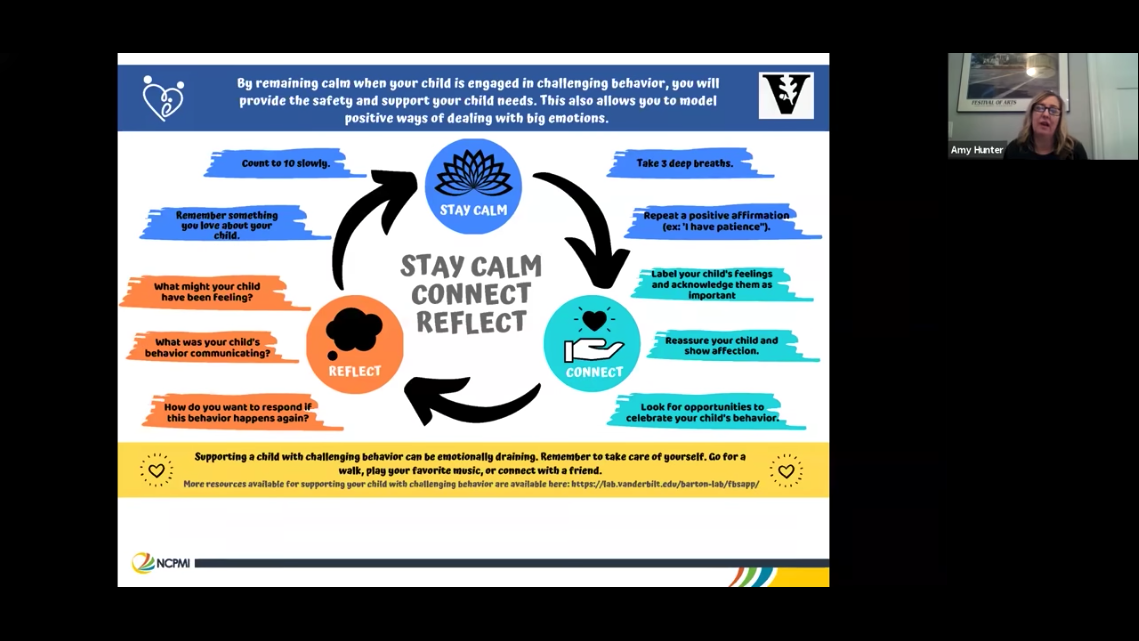
Are you providing early intervention or preschool services using distance technology? Do you have questions about how you can support families as they help their children with learning activities or conducting intervention within routines? NCPMI faculty share ideas on checking in with families, how to respond to difficult questions, and resources that might be shared.
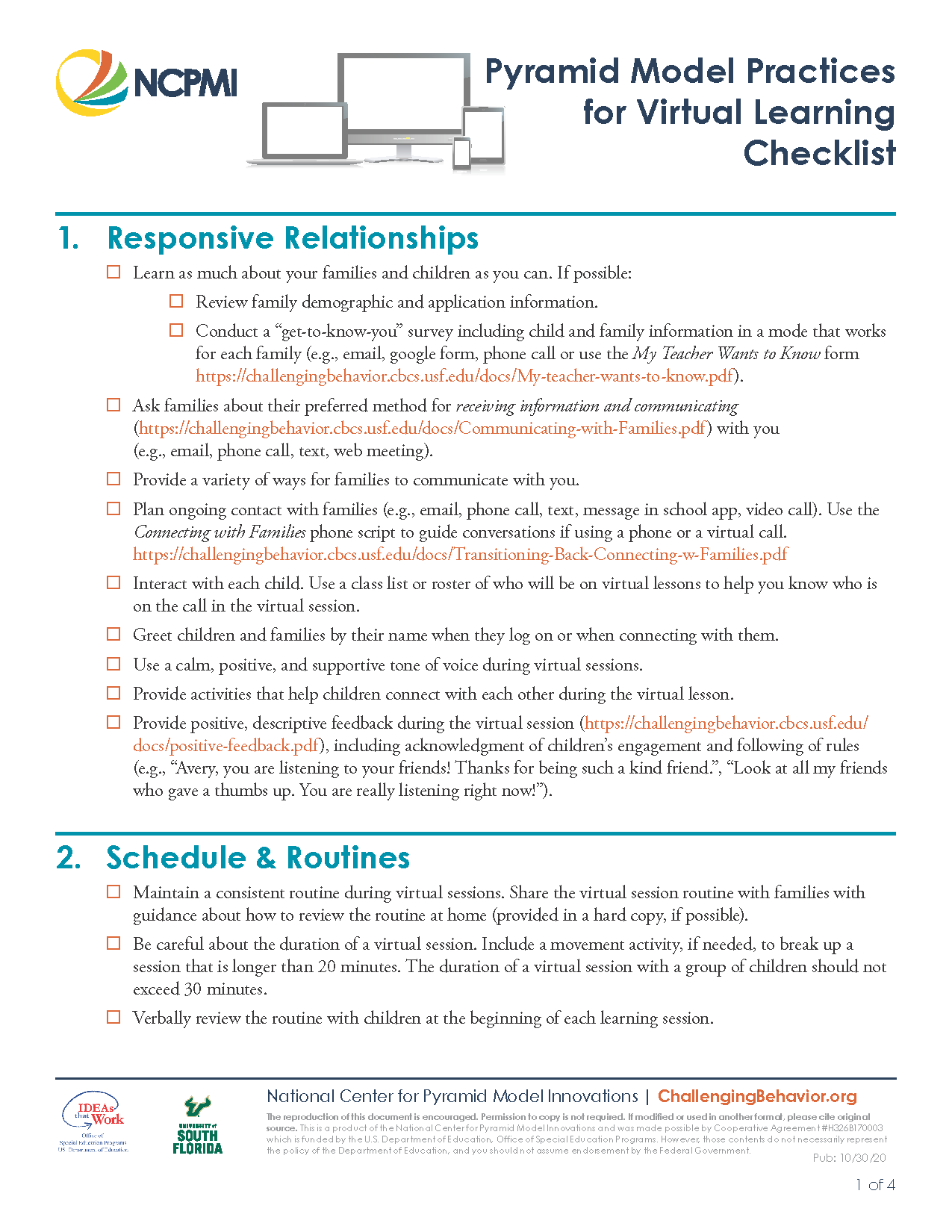
This checklist provides teachers with guidance about using Pyramid Model practices within virtual learning.
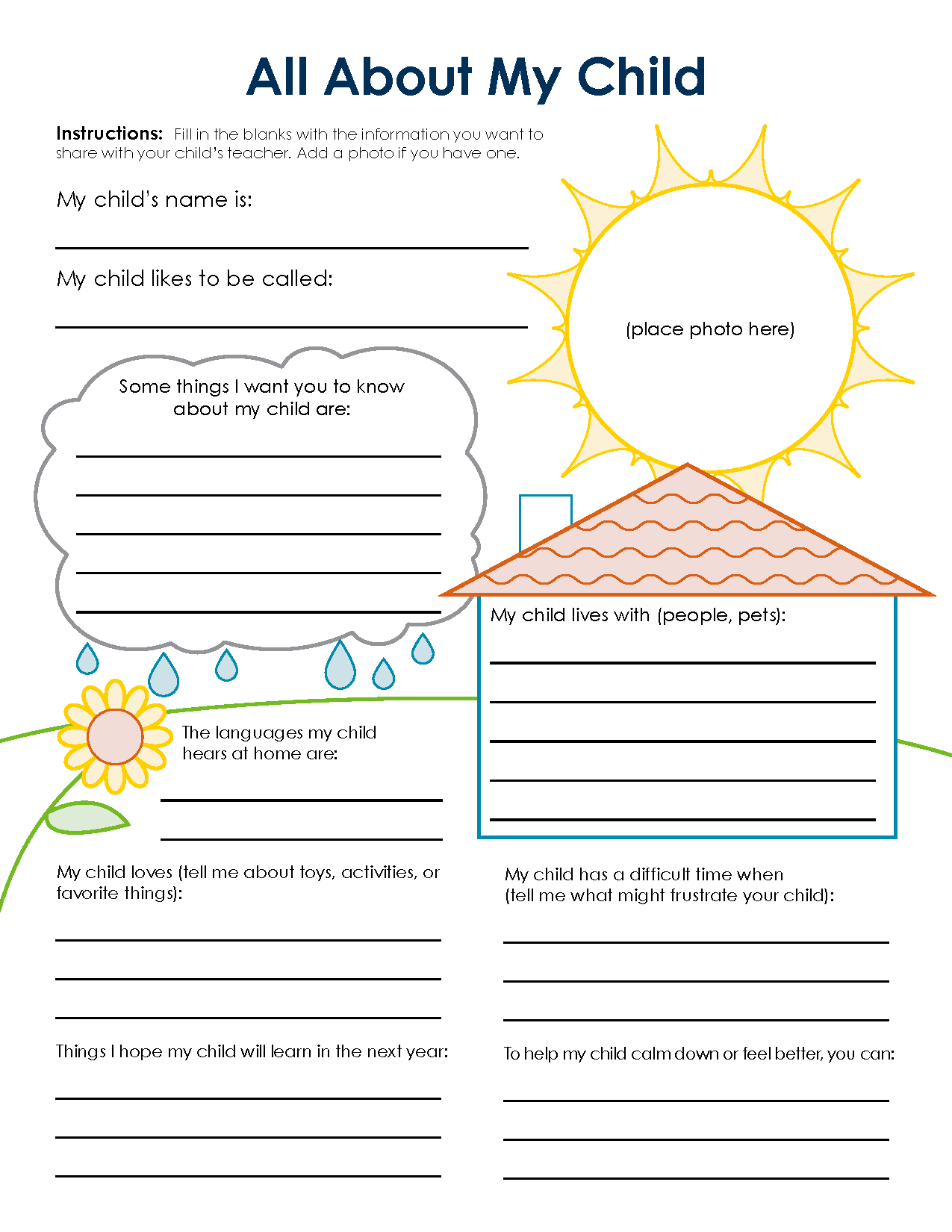
This document is designed to be used to gather information about the children in your classrooms. It will provide teachers with important information to help them build a relationship with each and every child and family.
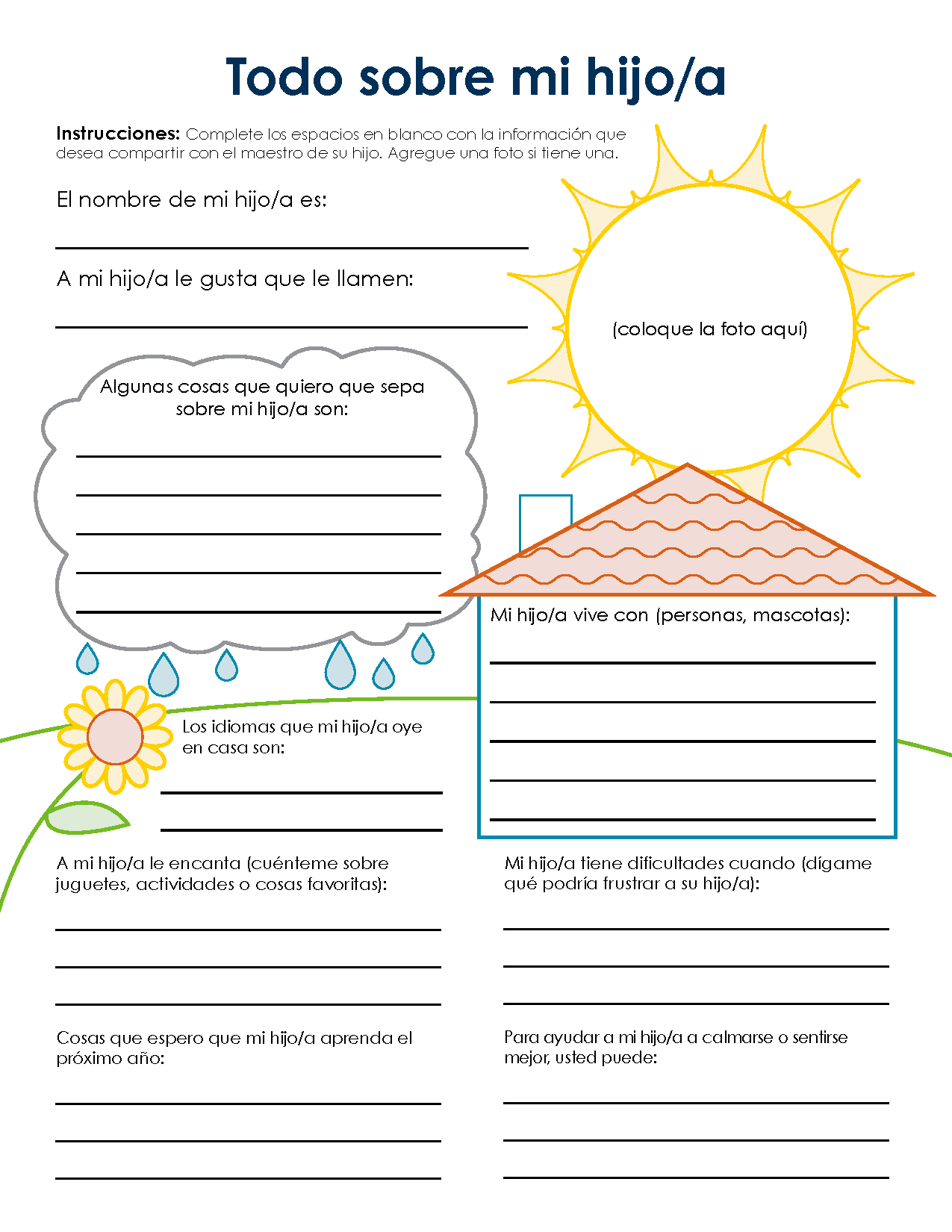
This document is designed to be used to gather information about the children in your classrooms. It will provide teachers with important information to help them build a relationship with each and every child and family.

With children learning at home, our connections with families are so important. These tips will
help you be focused and responsive during those calls or virtual meetings.

Join NCPMI leaders Lise Fox and Mary Louise Hemmeter for a discussion about what practices should be implemented to support children as they return to the classroom. The presenters will identify the priority social-emotional teaching practices for the preschool classroom, the use of Pyramid Model practices to support children entering kindergarten, and partnerships with families.

Here are tips and ideas for helping children identify emotions when your face, your most expressive feature, is covered by a mask. Use these strategies to let children know that behind the mask, a kind and warm expression is still there!

Use this scripted story to teach a child about the why and how to wash hands.

Use this scripted story to teach a child about the why and how to wash hands.
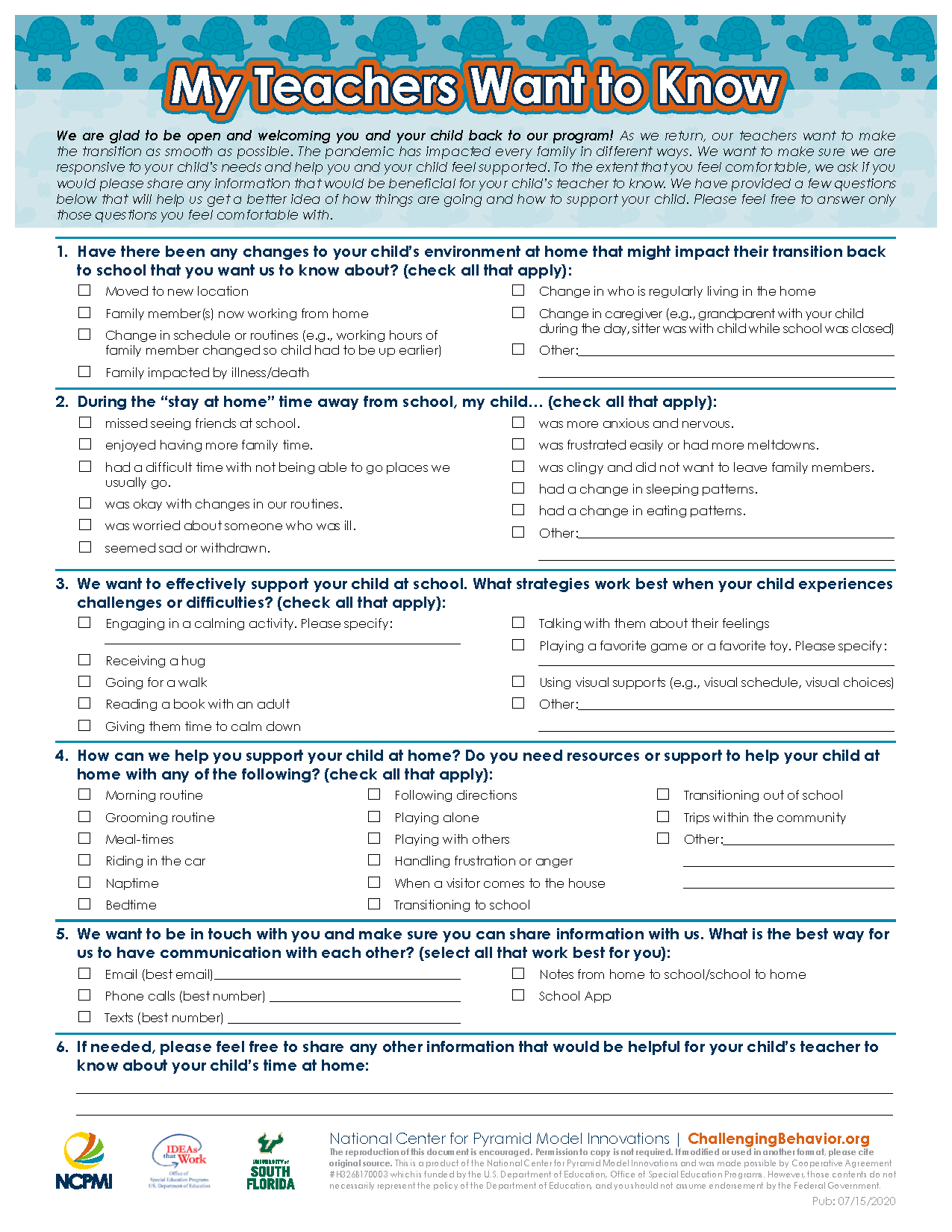
Programs can use this form to gather information from families as to the impact from the pandemic and best ways to support the child and family.
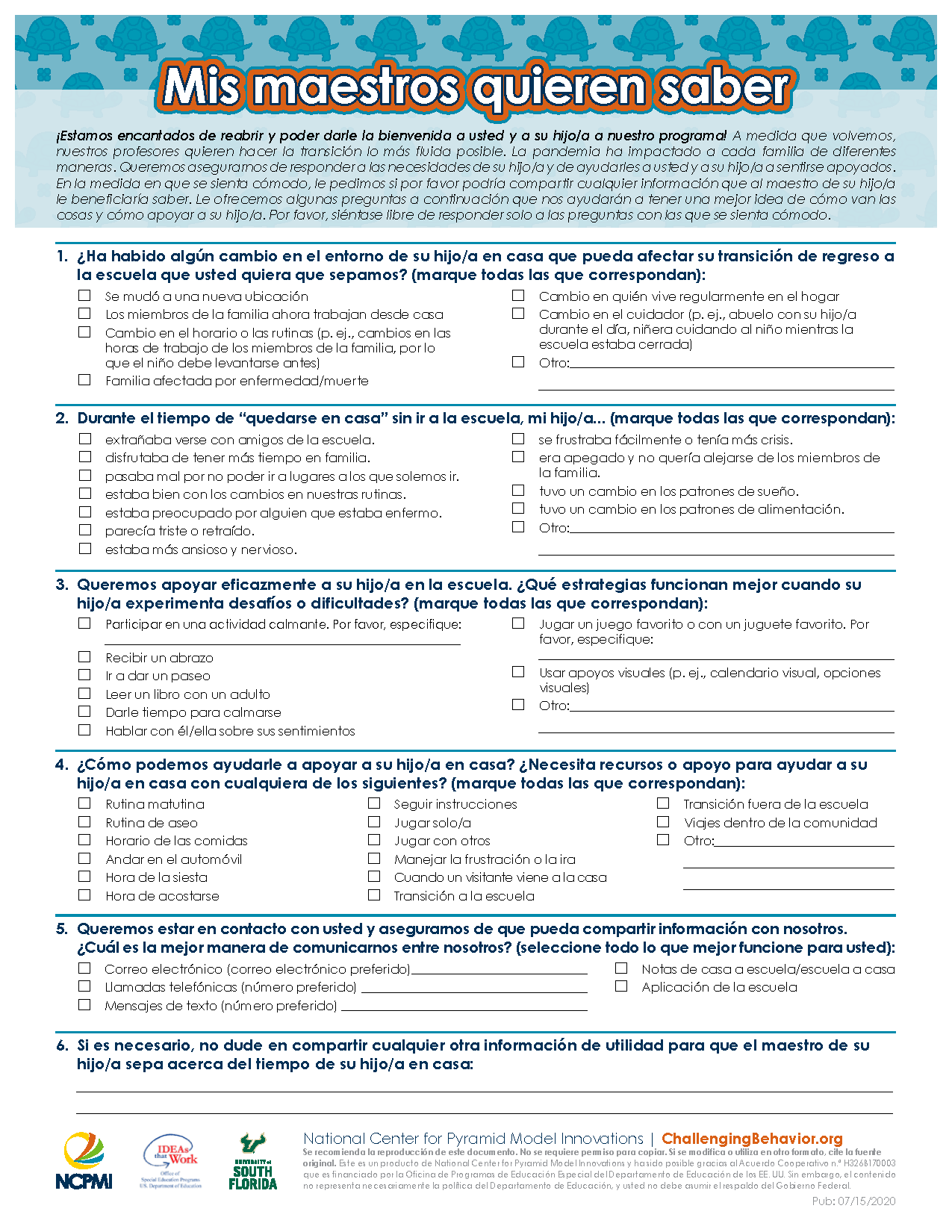
Programs can use this form to gather information from families as to the impact from the pandemic and best ways to support the child and family.
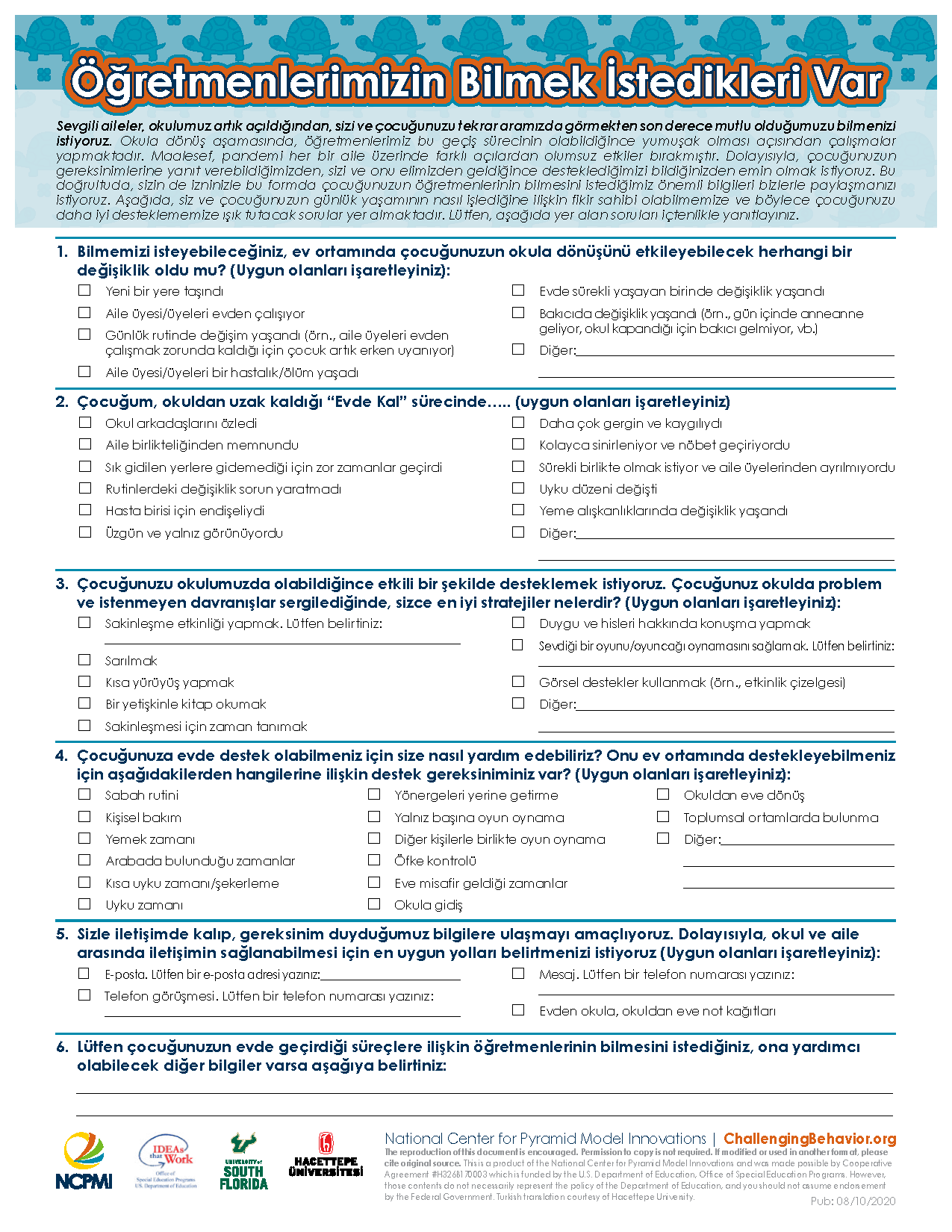
Programs can use this form to gather information from families as to the impact from the pandemic and best ways to support the child and family.
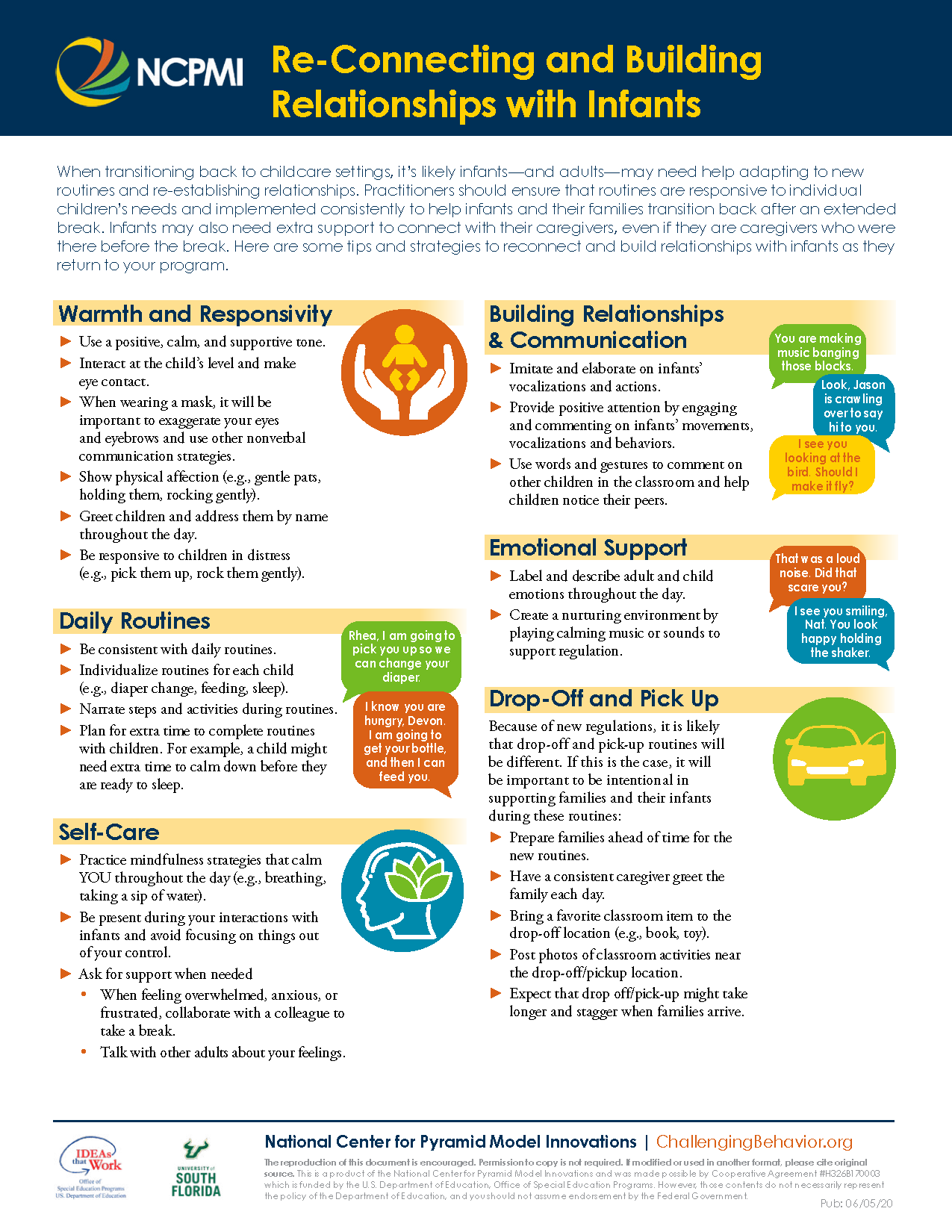
Use this tip sheet to help practitioners of infants and toddlers intentionally plan and think about how to reconnect, help children transition back to the classroom, and support children’s social and emotional development after being away from the program.
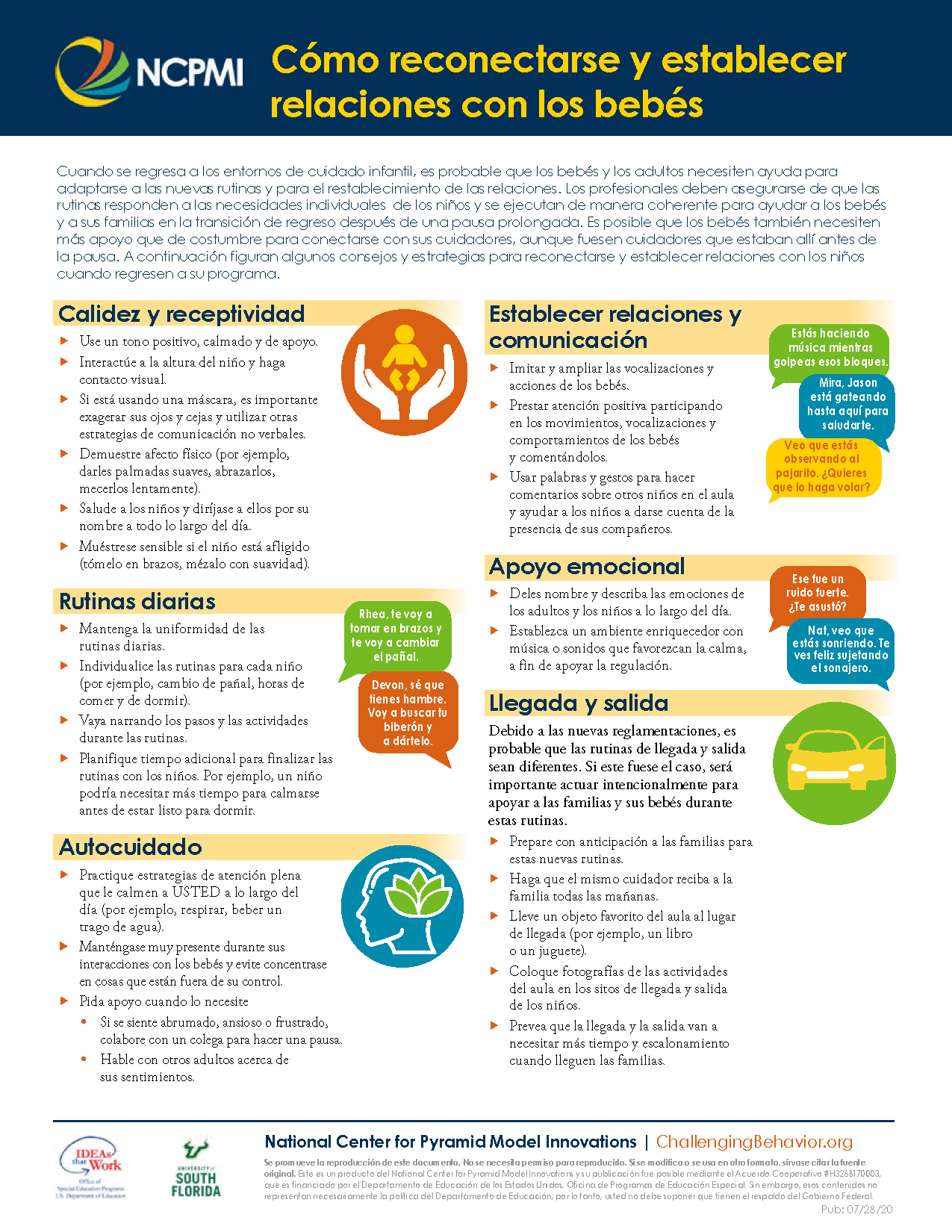
Use this tip sheet to help practitioners of infants and toddlers intentionally plan and think about how to reconnect, help children transition back to the classroom, and support children’s social and emotional development after being away from the program.
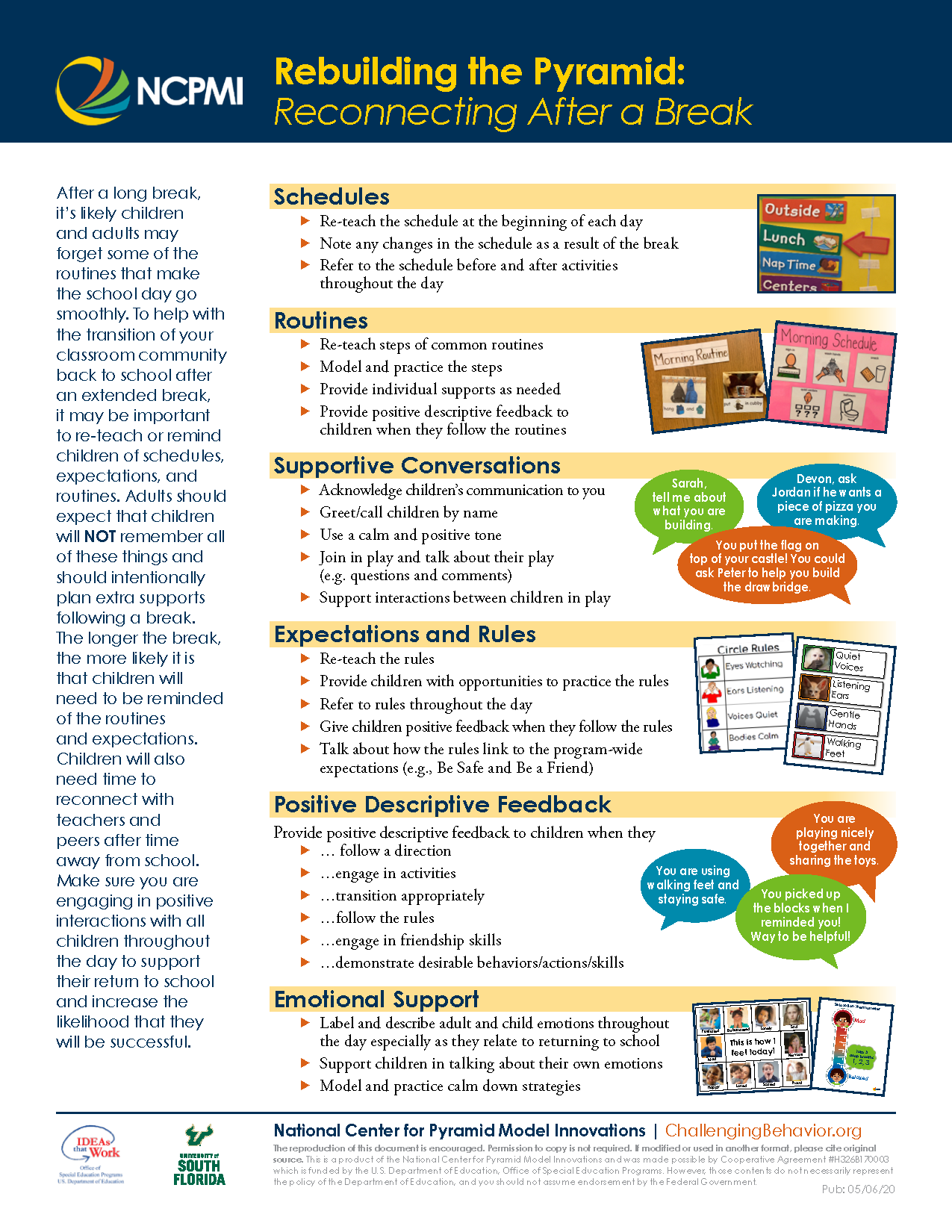
Rebuilding the Pyramid: Reconnecting After a Break is a one page tip sheet to help preschool practitioners intentionally plan and think about how to support children’s use of social and emotional skills that are important to re-teach or remind children after being away from a classroom. Areas to focus on include: schedules and routines, supportive conversations, expectations and rules, positive descriptive feedback and emotional support.
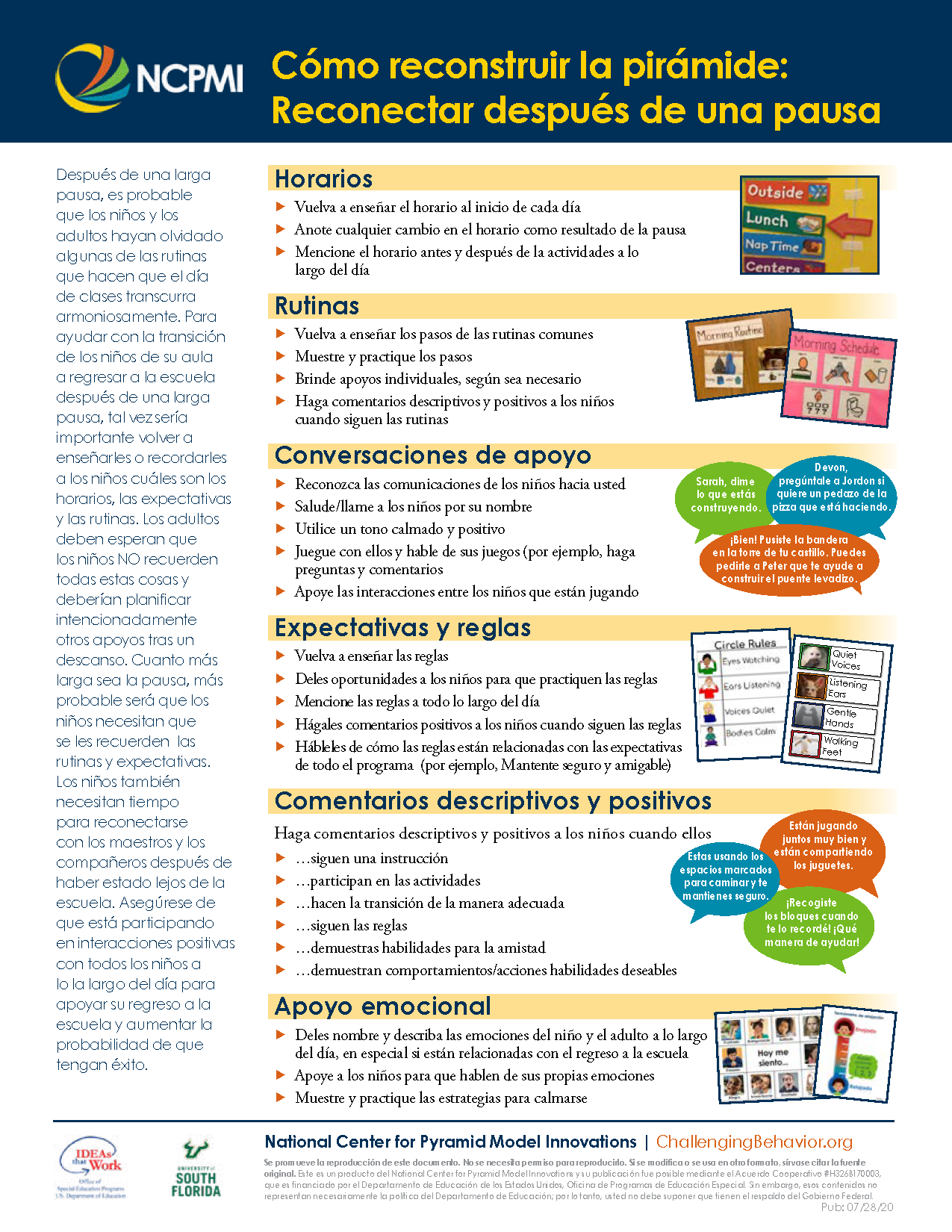
Rebuilding the Pyramid: Reconnecting After a Break is a one page tip sheet to help preschool practitioners intentionally plan and think about how to support children’s use of social and emotional skills that are important to re-teach or remind children after being away from a classroom. Areas to focus on include: schedules and routines, supportive conversations, expectations and rules, positive descriptive feedback and emotional support.
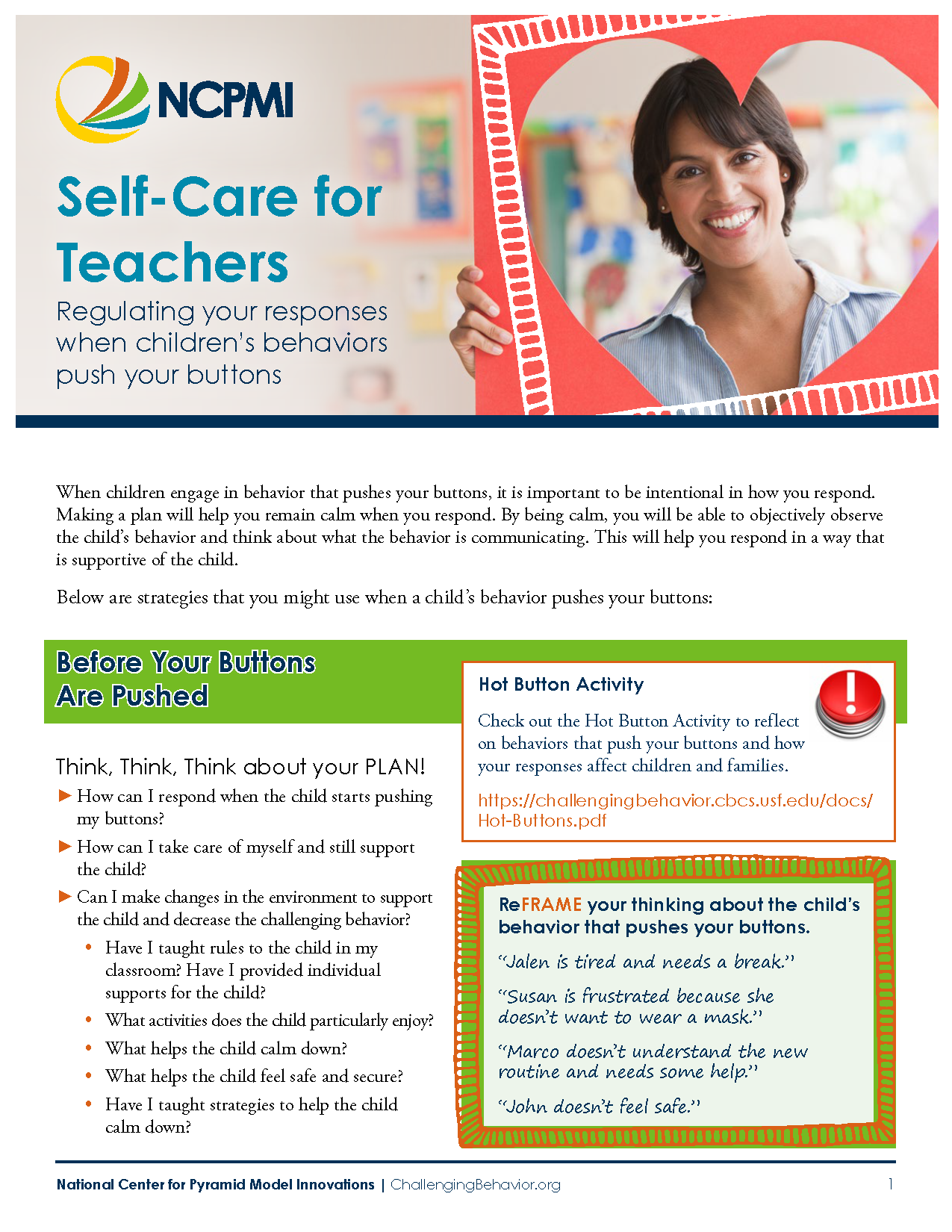
When children engage in behavior that pushes your buttons, it is important to be intentional in how you respond. This resource provides strategies that you might use when a child’s behavior pushes your buttons to help you respond in a way that is supportive of the child.

This document is designed to guide the Program Leadership Team around considerations for supporting children, families, and staff as they return to the program. The guidance includes Pyramid Model practices you know and encourages you to think about those strategies from a trauma-informed perspective. While the leadership team may not know who among children, families, and staff have or are experiencing trauma, a trauma-informed approach guides programs in providing a safe and nurturing environment where children, families, and staff can build resilience, feel safe, and recover.
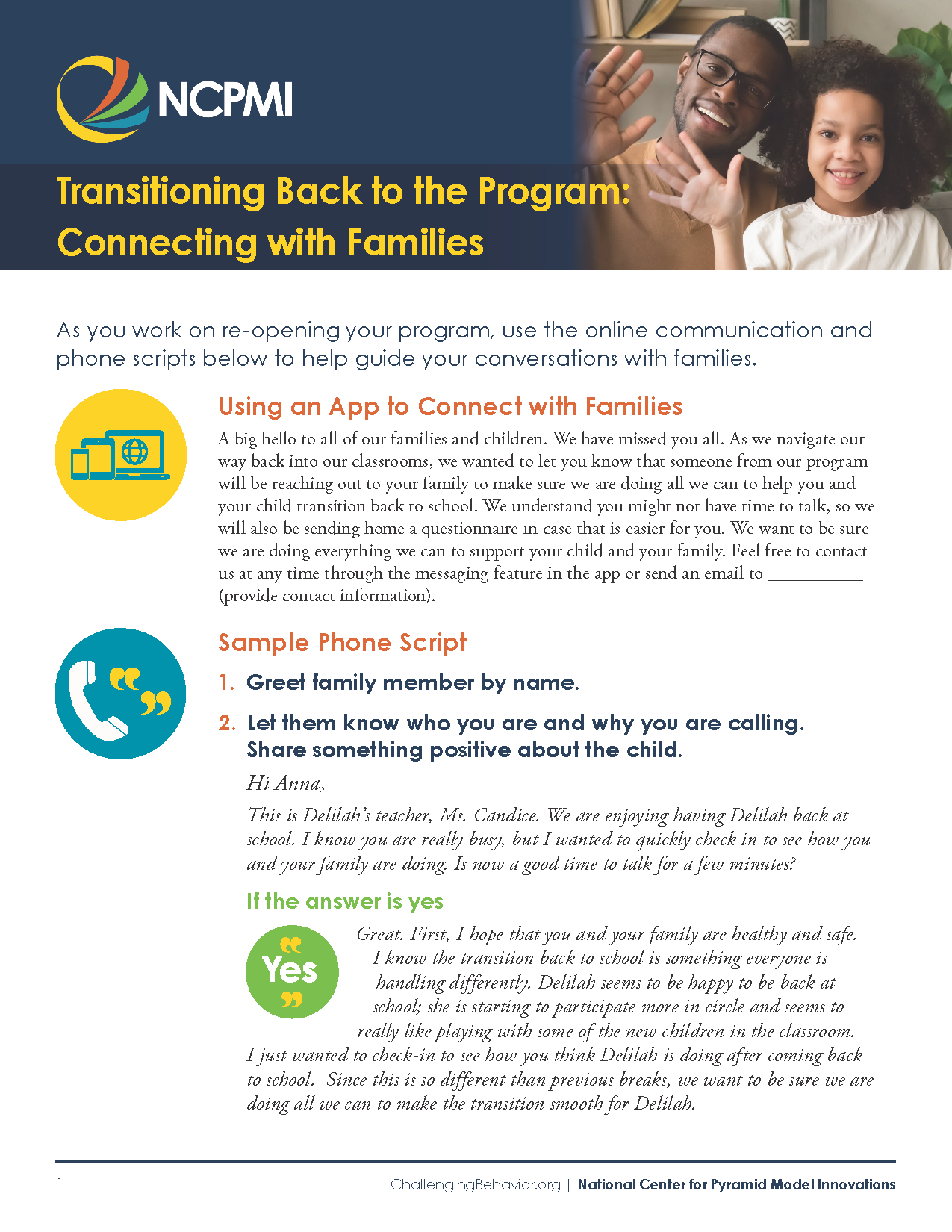
As early childhood programs work on re-opening after a long closure, they can use these online communication and phone scripts to help guide your conversations with families.

This scripted story helps to explain to children the how, why, and when of wearing face masks.

This scripted story helps to explain to children the how, why, and when of wearing face masks.


